Advantages and Disadvantages of Globalization Essay
When discussing the drawbacks and benefits of globalization, essays tend to be on the longer side. The example below is a brief exploration of this complex subject. Learn more in this concise globalization pros and cons essay.

Introduction
- Benefits and Disadvantages of Globalization
Reducing Negative Effects
In today’s world, globalization is a process that affects all aspects of people’s lives. It also has a crucial impact on businesses and governments as it provides opportunities for development while causing significant challenges. This paper discusses the advantages and disadvantages of globalization using evidence from academic sources. The report also suggests how governments and companies may implement to reduce the negative impact of the process.
Benefits and Drawbacks of Globalization
Globalization is a complex concept that can be defined by the process of interaction between organizations, businesses, and people on an international scale, which is driven by international trade. Some people may associate it with uniformity, while others can perceive it as the cause of diversification. The reason for such a difference in public opinion is that globalization has both advantages and disadvantages that should be analyzed.
The most significant positive aspects of globalization include global economic growth, the elimination of barriers between nations, and the establishment of competition between countries, which can potentially lead to a decrease in prices. Globalization supports free trade, creates jobs, and helps societies to become more tolerant towards each other. In addition, this process may increase the speed of financial and commercial operations, as well as reduce the isolation of poor populations (Burlacu, Gutu, & Matei, 2018; Amavilah, Asongu, & Andrés, 2017).
The disadvantages of globalization are that it causes the transfer of jobs from developed to lower-cost countries, a decrease in the national intellectual potential, the exploitation of labor, and a security deficit. Moreover, globalization leads to ecological deficiency (Ramsfield, Bentz, Faccoli, Jactel, & Brockerhoff, 2016). In addition, this process may result in multinational corporations influencing political decisions and offering unfair working conditions to their employees.
Firms and governments can work on eliminating the negative effects of globalization in the following ways. For example, countries should work on microeconomic policies, such as enhancing opportunities for education and career training and establishing less rigid labor markets. In addition, governments can build the necessary institutional infrastructure to initiate economic growth. To solve the problem of poor working conditions, it is vital to establish strict policies regarding minimum wages and the working environment for employees. A decrease in the national intellectual potential may be addressed by offering a broad range of career opportunities with competitive salaries, as well as educating future professionals on how their skills can solve problems on the local level.
Companies, in their turn, may invest in technologies that may lead to more flexible energy infrastructure, lower production costs, and decrease carbon emissions. They can also establish strong corporate cultures to support their workers and provide them with an opportunity to share their ideas and concerns. Such an approach may eliminate employees’ migration to foreign organizations and increase their loyalty to local organizations. It is vital for companies to develop policies aimed at reducing a negative impact on the environment as well by using less destructive manufacturing alternatives and educating their employees on ecology-related issues.
Globalization has a significant impact on companies, governments, and the population. It can be considered beneficial because it helps to eliminate barriers between nations, causes competition between countries, and initiates economic growth. At the same time, globalization may result in a decrease in the national intellectual potential, the exploitation of labor, and ecology deficiency. To address these problems, organizations and governments can develop policies to enhance the population’s education, improve working conditions, and reduce carbon emissions.
Amavilah, V., Asongu, S. A., & Andrés, A. R. (2017). Effects of globalization on peace and stability: Implications for governance and the knowledge economy of African countries. Technological Forecasting and Social Change , 122 (C), 91-103.
Burlacu, S., Gutu, C., & Matei, F. O. (2018). Globalization – Pros and cons. Calitatea , 19 (S1), 122-125.
Ramsfield, T. D., Bentz, B. J., Faccoli, M., Jactel, H., & Brockerhoff, E. G. (2016). Forest health in a changing world: Effects of globalization and climate change on forest insect and pathogen impacts. Forestry , 89 (3), 245-252.
- Chicago (A-D)
- Chicago (N-B)
IvyPanda. (2023, October 29). Advantages and Disadvantages of Globalization Essay. https://ivypanda.com/essays/advantages-and-disadvantages-of-globalization/
"Advantages and Disadvantages of Globalization Essay." IvyPanda , 29 Oct. 2023, ivypanda.com/essays/advantages-and-disadvantages-of-globalization/.
IvyPanda . (2023) 'Advantages and Disadvantages of Globalization Essay'. 29 October.
IvyPanda . 2023. "Advantages and Disadvantages of Globalization Essay." October 29, 2023. https://ivypanda.com/essays/advantages-and-disadvantages-of-globalization/.
1. IvyPanda . "Advantages and Disadvantages of Globalization Essay." October 29, 2023. https://ivypanda.com/essays/advantages-and-disadvantages-of-globalization/.
Bibliography
IvyPanda . "Advantages and Disadvantages of Globalization Essay." October 29, 2023. https://ivypanda.com/essays/advantages-and-disadvantages-of-globalization/.
- Soil Ecology and Restoration Science
- The Ecology of the Family
- Vitamin D Deficiency: Causes and Consequences
- The ecology of tigers
- Curbing Iron Deficiency Anaemia
- Testosterone deficiency for male health
- Discussion: Ecology and Capitalism
- Disease Ecology Definition
- Ecology of Commerce: Green Taxes
- The American Black Bear's Ecology
- Managing Multinational Operations
- Multinational Corporations Economic Implications
- Globalisation and Labour Market
- Impact of Globalisation on Labour
- The Origins of the Modern World
An economist explains the pros and cons of globalization

Piling up: Global trade has increased, but has it been a positive or negative force? Image: REUTERS/Tyrone Siu
.chakra .wef-1c7l3mo{-webkit-transition:all 0.15s ease-out;transition:all 0.15s ease-out;cursor:pointer;-webkit-text-decoration:none;text-decoration:none;outline:none;color:inherit;}.chakra .wef-1c7l3mo:hover,.chakra .wef-1c7l3mo[data-hover]{-webkit-text-decoration:underline;text-decoration:underline;}.chakra .wef-1c7l3mo:focus,.chakra .wef-1c7l3mo[data-focus]{box-shadow:0 0 0 3px rgba(168,203,251,0.5);} Gita Gopinath
Ceri parker.

.chakra .wef-9dduvl{margin-top:16px;margin-bottom:16px;line-height:1.388;font-size:1.25rem;}@media screen and (min-width:56.5rem){.chakra .wef-9dduvl{font-size:1.125rem;}} Explore and monitor how .chakra .wef-15eoq1r{margin-top:16px;margin-bottom:16px;line-height:1.388;font-size:1.25rem;color:#F7DB5E;}@media screen and (min-width:56.5rem){.chakra .wef-15eoq1r{font-size:1.125rem;}} Global Governance is affecting economies, industries and global issues

.chakra .wef-1nk5u5d{margin-top:16px;margin-bottom:16px;line-height:1.388;color:#2846F8;font-size:1.25rem;}@media screen and (min-width:56.5rem){.chakra .wef-1nk5u5d{font-size:1.125rem;}} Get involved with our crowdsourced digital platform to deliver impact at scale
Stay up to date:, global governance.
Every industrial revolution has driven a wave of globalization. The first wave was driven by innovations such as the steam engine and the industrial weaving machine; the second by the assembly line, the car and the plane; and the third by the digital revolution.

As we enter the fourth wave of globalization, driven by the digital revolution, there is renewed debate over whether it is a beneficial force: powering economic growth, and allowing the spread of ideas to improve people’s lives; or whether it erodes communities, and widens the gap between the elites and the rest of the world.

Globalization results in increased trade and lower prices. It heightens competition within domestic product, capital, and labour markets, as well as among countries adopting different trade and investment strategies.
But how do these impacts net out? What are the positive and negative effects of globalization? The below is an edited transcript of a conversation with Gita Gopinath, Chief Economist of the International Monetary Fund (IMF).
Overall, what are the advantages of globalization?
The advantages of globalization are actually much like the advantages of technological improvement. They have very similar effects: they raise output in countries, raise productivity, create more jobs, raise wages, and lower prices of products in the world economy.
What might be the advantages of globalization that someone would feel in their day-to-day life?
I think something that's not sufficiently appreciated about, for instance, international trade is that it reduces the prices of goods that they consume. So if you look at day-to-day things that you purchase, in terms of washing machines, or cars, or even clothing, because of international trade we've had a decline in prices of these goods, so they have become far more affordable for a lot of people in the world.
How have the benefits played out in advanced economies versus poorer ones over the last three decades?
Both advanced economies and developing economies have benefited overall in terms of having higher productivity, more job creation, and higher wages. As we've always known, and this is true again with technology, there are always some winners and losers. So there are communities and there are workers who lose out when there is more trade integration. That is what we're seeing right now in terms of discontent with international trade.
Who have been the biggest losers?
The biggest losers from international trade are always those whose skills have a cheaper competitor in a different market. So, in the case of the US, it's been those who work in the manufacturing sector because jobs in the manufacturing sector have been outsourced to countries where labour is far cheaper.
On the other hand, in developing countries, more capital-intensive goods get imported more cheaply from the outside. So if you're a manufacturer of a capital-intensive good in a developing country you tend to lose because of that competition.
This is how it is with international trade: production goes to wherever it is most efficient to produce. So, when people in any country are exposed to this kind of competition, some win and some lose.

Is it possible as an economist to come up with a verdict? Has this wave of globalized trade been a net positive or a net negative?
If you say, I'm going to look at it from a measure of overall effect on a country's income, on its purchasing power, on the prices that its people pay, overall I think the evidence that we have all points to it being a net positive.
Now, if you frame the question as, has international trade been good for the manufacturing worker in the US? Then the answer to that would be “not fully”; it's been very costly in terms of jobs and wages for them.

How optimistic are you that this next wave of globalization offers a better future?
I would make a couple of points. First, the previous waves of globalization have been quite successful in lifting a large number of people out of poverty and so we should appreciate that.
The second thing is that any form of globalization will generate winners and losers. So even if you have the perfect, most optimal international trade agreements, there will always be those who lose out because of competition, in the exact same way that people lose out whenever there's a new technology being developed.
And so if we want to make sure that the next wave of globalization is even more successful, it has to be complemented with good, sound domestic policies that help those who are getting left out.
How optimistic are you that the trade war between the US and China will be swiftly resolved?
It's absolutely essential that it be resolved, and it gets resolved in a way that's long lasting. The world economy has lived with the uncertainty about trade tensions for a while now and if there is any solution and there is a sense that the solution is only transitory and something can again get triggered in the future, I think that's very costly.
I'd say I'm mildly optimistic because I think leaders in the world are recognizing that these trade tensions are having a negative effect on their economies and so it would make sense to sit down and resolve it.
Don't miss any update on this topic
Create a free account and access your personalized content collection with our latest publications and analyses.
License and Republishing
World Economic Forum articles may be republished in accordance with the Creative Commons Attribution-NonCommercial-NoDerivatives 4.0 International Public License, and in accordance with our Terms of Use.
The views expressed in this article are those of the author alone and not the World Economic Forum.
Related topics:
The agenda .chakra .wef-n7bacu{margin-top:16px;margin-bottom:16px;line-height:1.388;font-weight:400;} weekly.
A weekly update of the most important issues driving the global agenda
.chakra .wef-1dtnjt5{display:-webkit-box;display:-webkit-flex;display:-ms-flexbox;display:flex;-webkit-align-items:center;-webkit-box-align:center;-ms-flex-align:center;align-items:center;-webkit-flex-wrap:wrap;-ms-flex-wrap:wrap;flex-wrap:wrap;} More on Global Governance .chakra .wef-17xejub{-webkit-flex:1;-ms-flex:1;flex:1;justify-self:stretch;-webkit-align-self:stretch;-ms-flex-item-align:stretch;align-self:stretch;} .chakra .wef-nr1rr4{display:-webkit-inline-box;display:-webkit-inline-flex;display:-ms-inline-flexbox;display:inline-flex;white-space:normal;vertical-align:middle;text-transform:uppercase;font-size:0.75rem;border-radius:0.25rem;font-weight:700;-webkit-align-items:center;-webkit-box-align:center;-ms-flex-align:center;align-items:center;line-height:1.2;-webkit-letter-spacing:1.25px;-moz-letter-spacing:1.25px;-ms-letter-spacing:1.25px;letter-spacing:1.25px;background:none;padding:0px;color:#B3B3B3;-webkit-box-decoration-break:clone;box-decoration-break:clone;-webkit-box-decoration-break:clone;}@media screen and (min-width:37.5rem){.chakra .wef-nr1rr4{font-size:0.875rem;}}@media screen and (min-width:56.5rem){.chakra .wef-nr1rr4{font-size:1rem;}} See all

This is why the number of refugees could double in the next decade, according to the head of UNHCR
Liam Coleman
March 7, 2024

AI: Will governance catch up with the tech in 2024?
David Elliott
March 1, 2024

The World Economic Forum: A Swiss success story
Selina Hänni and Micol Lucchi
January 17, 2024

Workers' rights are vital to revitalizing democracy. Here's why
Luc Triangle
January 15, 2024

How to thrive when uncertainty becomes the new norm for governance
January 11, 2024

How to build business resilience in an era of risk turbulence
Carolina Klint
January 10, 2024
- Business Essentials
- Leadership & Management
- Credential of Leadership, Impact, and Management in Business (CLIMB)
- Entrepreneurship & Innovation
- *New* Digital Transformation
- Finance & Accounting
- Business in Society
- For Organizations
- Support Portal
- Media Coverage
- Founding Donors
- Leadership Team

- Harvard Business School →
- HBS Online →
- Business Insights →
Business Insights
Harvard Business School Online's Business Insights Blog provides the career insights you need to achieve your goals and gain confidence in your business skills.
- Career Development
- Communication
- Decision-Making
- Earning Your MBA
- Negotiation
- News & Events
- Productivity
- Staff Spotlight
- Student Profiles
- Work-Life Balance
- Alternative Investments
- Business Analytics
- Business Strategy
- Business and Climate Change
- Design Thinking and Innovation
- Digital Marketing Strategy
- Disruptive Strategy
- Economics for Managers
- Entrepreneurship Essentials
- Financial Accounting
- Global Business
- Launching Tech Ventures
- Leadership Principles
- Leadership, Ethics, and Corporate Accountability
- Leading with Finance
- Management Essentials
- Negotiation Mastery
- Organizational Leadership
- Power and Influence for Positive Impact
- Strategy Execution
- Sustainable Business Strategy
- Sustainable Investing
- Winning with Digital Platforms
6 Pros and Cons of Globalization in Business to Consider

- 01 Apr 2021
Throughout history, commerce and business have been limited by certain geographic constraints. In its earliest days, trade happened between neighboring tribes and city-states. As humans domesticated the horse and other animals, the distances they could travel to trade increased. These distances increased further with the development of seafaring capabilities.
Although humans have been using ships for centuries to transport goods, cargo, people, and ideas around the world, it wasn’t until the development of the airplane that the blueprint of a “globalized economy” was laid. This was for a simple reason: You can travel greater distances faster than ever before.
The development of the internet accelerated this process even more, making it easier to communicate and collaborate with others. Today, your international co-worker, business partner, customer, or friend is only a few taps or clicks away.
Globalization has had numerous effects—both positive and negative—on business and society at large. Here’s an overview of the pros and cons of globalization in business.
Access your free e-book today.
What Is Globalization?
Globalization is the increased flow of goods, services, capital, people, and ideas across international boundaries according to the online course Global Business , taught by Harvard Business School Professor Forest Reinhardt.
“We live in an age of globalization,” Reinhardt says in Global Business . “That is, national economies are even more tightly connected with one another than ever before.”
How Globalization Affects Daily Life
Globalization has had a significant impact on various aspects of daily life.
For example, it’s changed the way consumers shop for products and services. Today, 70 percent of Americans shop online. In 2022, there were 268 million digital buyers in the US and by 2025, this number is predicted to reach 285 million.
In addition, the globalized economy has opened up new job markets by making it more feasible to hire overseas workers. This has created a wide range of career opportunities for both job seekers and employers.
The emergence of remote work post-pandemic was also made possible by globalization. According to a survey from WFH Research , only seven percent of paid workdays in the US were remote in 2019. However, this number climbed to 29 percent by January 2024.
Check out the video below to learn more about globalization, and subscribe to our YouTube channel for more explainer content!
Advantages of Globalization
1. economic growth.
It’s widely believed that one of the benefits of globalization is greater economic growth for all parties. There are several reasons why this might be the case, including:
- Access to labor: Globalization gives all nations access to a wider labor pool. Developing nations with a shortage of knowledge workers might, for example, “import” labor to kickstart industry. Wealthier nations, on the other hand, might outsource low-skill work to developing nations with a lower cost of living to reduce the cost of goods sold and pass those savings on to the customer.
- Access to jobs: This point is directly related to labor. Through globalization, developing nations often gain access to jobs in the form of work that’s been outsourced by wealthier nations. While there are potential pitfalls to this (see “Disproportionate Growth” below), this work can significantly contribute to the local economy.
- Access to resources: One of the primary reasons nations trade is to gain access to resources they otherwise wouldn’t have. Without this flow of resources across borders, many modern luxuries would be impossible to manufacture or produce. Smartphones, for example, are dependent on rare earth metals found in limited areas around the world.
- The ability for nations to “specialize”: Global and regional cooperation allow nations to heavily lean into their economic strengths, knowing they can trade products for other resources. An example is a tropical nation that specializes in exporting a certain fruit. It’s been shown that when nations specialize in the production of goods or services in which they have an advantage, trade benefits both parties.

2. Increased Global Cooperation
For a globalized economy to exist, nations must be willing to put their differences aside and work together. Therefore, increased globalization has been linked to a reduction—though not an elimination—of conflict.
“Of course, as long as there have been nations, they've been connected with each other through the exchange of lethal force—through war and conquest—and this threat has never gone away,” Reinhardt says in Global Business . “The conventional wisdom has been that the increased intensity of these other flows—goods, services, capital, people, and so on—have reduced the probability that the world's nations will fall back into the catastrophe of war.”

3. Increased Cross-Border Investment
According to the course Global Business , globalization has led to an increase in cross-border investment. At the macroeconomic level, this international investment has been shown to enhance welfare on both sides of the equation.
The country that’s the source of the capital benefits because it can often earn a higher return abroad than domestically. The country that receives the inflow of capital benefits because that capital contributes to investment and, therefore, to productivity. Foreign investment also often comes with, or in the form of, technology, know-how, or access to distribution channels that can help the recipient nation.
Disadvantages of Globalization
1. increased competition.
When viewed as a whole, global free trade is beneficial to the entire system. Individual companies, organizations, and workers can be disadvantaged, however, by global competition. This is similar to how these parties might be disadvantaged by domestic competition: The pool has simply widened.
With this in mind, some firms, industries, and citizens may elect governments to pursue protectionist policies designed to buffer domestic firms or workers from foreign competition. Protectionism often takes the form of tariffs, quotas, or non-tariff barriers, such as quality or sanitation requirements that make it more difficult for a competing nation or business to justify doing business in the country. These efforts can often be detrimental to the overall economic performance of both parties.
“Although we live in an age of globalization, we also seem to be living in an age of anti-globalization,” Reinhardt says in Global Business . “Dissatisfaction with the results of freer trade, concern about foreign investment, and polarized views about immigration all seem to be playing important roles in rich-country politics in the United States and Europe. The threats in Western democracy to the post-war globalist consensus have never been stronger.”
2. Disproportionate Growth
Another issue of globalization is that it can introduce disproportionate growth both between and within nations. These effects must be carefully managed economically and morally.
Within countries, globalization often has the effect of increasing immigration. Macroeconomically, immigration increases gross domestic product (GDP), which can be an economic boon to the recipient nation. Immigration may, however, reduce GDP per capita in the short run if immigrants’ income is lower than the average income of those already living in the country.
Additionally, as with competition, immigration can benefit the country as a whole while imposing costs on people who may want their government to restrict immigration to protect them from those costs. These sentiments are often tied to and motivated—at least in part—by racism and xenophobia.
“Meanwhile, outside the rich world, hundreds of millions of people remain mired in poverty,” Reinhardt says in Global Business. “We don't seem to be able to agree about whether this is because of too much globalization or not enough.”
3. Environmental Concerns
Increased globalization has been linked to various environmental challenges, many of which are serious, including:
- Deforestation and loss of biodiversity caused by economic specialization and infrastructure development
- Greenhouse gas emissions and other forms of pollution caused by increased transportation of goods
- The introduction of potentially invasive species into new environments
While such issues are governed by existing or proposed laws and regulations, businesses have made climate change concerns and sustainability a priority by, for example, embracing the tenets of the triple bottom line and the idea of corporate social responsibility .

Managing the Risks of Globalization
The world is never going to abandon globalization. While it’s true that individual countries and regions put policies and practices in place that limit globalization, such as tariffs, it’s here to stay. The good news is that businesses and professionals willing to prepare for globalization’s challenges by developing strong social impact skills have the potential to benefit immensely.
Whether you’re a business owner, member of executive leadership, or an employee, understanding the impacts of globalization and how to identify its opportunities and risks can help you become more effective in your role and drive value for your organization.
Taking a course like Global Business is one path toward developing international business skills and gaining an understanding of the macroeconomic, political , and social conditions that continue to impact globalization.
Are you interested in breaking into a global market? Sharpen your knowledge of the international business world with Global Business , one of our online business in society courses . If you aren't sure which course is the right fit, download our free course flowchart .
This post was updated on February 26, 2024. It was originally published on April 15, 2021.

About the Author
- Current Affairs
- Pakistan Affairs
- World In Focus
- ESSAYS: CSS/PMS/PCS
- English (Precis & Composition)
- Pakistan Affairs MCQS
- Islamic Studies MCQS
- General Science & Ability MCQS
- Mathematics
- Everyday Science
- Scholarships
- Etimes Urdu
- Our Services

Pros and Cons of Globalization CSS ESSAY 2021

Table of Contents
Thesis Statement
Globalization has brought numerous advantages and disadvantages to the world, impacting various aspects of society, economy, and culture. In this This essay we will explore the pros and cons of globalization, highlighting its benefits in terms of economic growth, technological advancements, and cultural exchange, while also discussing its challenges related to inequality, cultural homogenization, and environmental concerns.
Introduction
Globalization has become a defining feature of the modern world, shaping various aspects of society, economy, and culture. As nations have become more interconnected and interdependent, it is important to examine the pros and cons of this phenomenon. While globalization has brought numerous benefits such as economic growth, technological advancements, and cultural exchange, it has also presented challenges including inequality, cultural homogenization, and environmental concerns. This essay will explore these pros and cons, shedding light on the complexities of globalization.
Exposition: Understanding Globalization
Globalization can be defined as the increasing interconnectedness and interdependence of nations in various aspects, including trade, communication, and technology. It has its roots in historical developments such as the expansion of trade routes and colonialism. However, it has gained momentum in recent decades due to advancements in transportation, communication, and the liberalization of trade policies. Globalization has enabled the flow of goods, services, capital, and information across borders, leading to increased global integration.
Pros of Globalization
Economic growth and development.
One of the key advantages of globalization is the potential for economic growth and development. Increased trade and investment opportunities have opened up new markets and expanded access to consumers worldwide. Businesses can now reach customers in different countries, leading to job creation, enhanced productivity, and overall economic prosperity. Globalization has also facilitated the transfer of technology and knowledge, fueling innovation and economic progress.
Technological Advancements
Globalization has accelerated the dissemination of information and knowledge through advancements in technology. The rapid exchange of ideas and expertise has led to breakthroughs in various fields, driving technological advancements. Innovations in areas such as communication, transportation, and medicine have transformed industries and improved the quality of life. Global collaboration and knowledge sharing have become easier, fostering scientific and technological progress.
Cultural Exchange and Diversity
The interconnectedness brought about by globalization has facilitated cultural exchange and diversity. People have greater exposure to diverse cultures, ideas, and perspectives from around the world. This exposure enriches societies by promoting cross-cultural understanding, tolerance, and appreciation. The exchange of artistic, literary, and culinary traditions has broadened cultural horizons, fostering a global tapestry of diversity and creativity.
Cons of Globalization
Economic inequality.
Despite the potential for economic growth, globalization has also led to increased economic inequality. The benefits of globalization are not evenly distributed, and wealth and resources tend to concentrate in the hands of a few. Developing countries often face challenges in competing with more developed nations, leading to disparities in wealth and living standards. Additionally, the exploitation of cheap labor in some parts of the world has raised concerns about fair trade practices and workers’ rights.
Cultural Homogenization
The dominance of Western cultural values and consumerism is a significant challenge posed by globalization. As global markets expand, there is a tendency for cultural homogenization, where local traditions and identities are marginalized or eroded. The influence of Western media, fashion, and entertainment can overshadow indigenous cultures, leading to the loss of cultural diversity. Preserving and promoting local traditions and languages becomes crucial in maintaining cultural richness and identity.
Environmental Concerns
Globalization has also raised environmental concerns. The increased movement of goods and people has resulted in higher carbon emissions and an ecological footprint. The overexploitation of natural resources to meet global demand poses threats to biodiversity and ecosystems. Environmental challenges, such as climate change and deforestation, require international cooperation and sustainable practices to mitigate their impact.
Addressing the Challenges
To manage the challenges of globalization, various strategies can be employed.
Economic Reforms and Redistribution
Implementing fair trade practices, ensuring workers’ rights, and promoting inclusive economic policies are essential in reducing economic inequality. Progressive taxation can help redistribute wealth and address disparities in income distribution.
Preserving Cultural Diversity
Supporting local arts, traditions, and languages is crucial in preserving cultural diversity. Governments and communities can take measures to protect and promote their cultural heritage, fostering intercultural dialogue and understanding.
Sustainable Development and Environmental Stewardship
Investing in renewable energy, adopting sustainable production and consumption practices, and strengthening international agreements on climate change and environmental protection are necessary steps in addressing environmental concerns. Global cooperation is vital in tackling shared environmental challenges.
Case Studies and Examples
Numerous case studies demonstrate both the positive impacts and negative consequences of globalization. For instance, countries like China and India have experienced remarkable economic growth and poverty reduction as a result of globalization. On the other hand, social unrest and environmental degradation have been observed in some regions due to unsustainable development practices.
Globalization is a multifaceted phenomenon with both benefits and challenges. While it has contributed to economic growth, technological advancements, and cultural exchange, it has also raised concerns regarding inequality, cultural homogenization, and environmental sustainability. Addressing these challenges requires a balanced approach that maximizes the benefits of globalization while mitigating its negative impacts. By promoting inclusive economic policies, preserving cultural diversity, and embracing sustainable practices, societies can navigate the complexities of globalization and create a more equitable and sustainable world.
RELATED ARTICLES MORE FROM AUTHOR
Boys will be boys css essay 2022, is pakistan ready for the digital revolution css essay 2020, i do not agree with what you have to say, but i’ll defend to the death your right to say it. css essay 2020, leave a reply cancel reply.
Save my name, email, and website in this browser for the next time I comment.
- Privacy Policy
If you're seeing this message, it means we're having trouble loading external resources on our website.
If you're behind a web filter, please make sure that the domains *.kastatic.org and *.kasandbox.org are unblocked.
To log in and use all the features of Khan Academy, please enable JavaScript in your browser.
World History Project - Origins to the Present
Course: world history project - origins to the present > unit 7, read: introduction to globalization.
- READ: International Institutions
- READ: Rise of China
- BEFORE YOU WATCH: Eradicating Smallpox
- WATCH: Eradicating Smallpox
- BEFORE YOU WATCH: Global China into the 21st Century
- WATCH: Global China into the 21st Century
- READ: Goods Across the World
- BEFORE YOU WATCH: Globalization I - The Upside
- WATCH: Globalization I - The Upside
- BEFORE YOU WATCH: Nonviolence and Peace Movements
- WATCH: Nonviolence and Peace Movements
- READ: Population and Environmental Trends, 1880 to the Present
- READ: Is the World Flat or Spiky?
- Global Interactions and Institutions
First read: preview and skimming for gist
Second read: key ideas and understanding content.
- What late twentieth-century trends, according to the author, led people to create the term “globalization”?
- What are some historical trends that accelerated globalization before the late twentieth century?
- What are some impacts of globalization in terms of migration and economics?
- What are some positive impacts of globalization, according to the author?
- What are some negative impacts of globalization, according to the author?
Third read: evaluating and corroborating
- What does globalization look like from your perspective? How does it affect your family and community? Do you think it has been a good thing for you? Why or why not?
- Globalization looks very differently studied through each of the three course frames. Pick one of the three course frames and describe the effects of globalization on your home town or neighborhood using only that frame narrative. How would your results have been different if you had chosen a different frame?
Introduction to Globalization
What is globalization, globalization’s effect on communities and economies, the pros and cons of globalization, want to join the conversation.
- Upvote Button navigates to signup page
- Downvote Button navigates to signup page
- Flag Button navigates to signup page
Economic Globalization – Pros and Cons (with Examples)
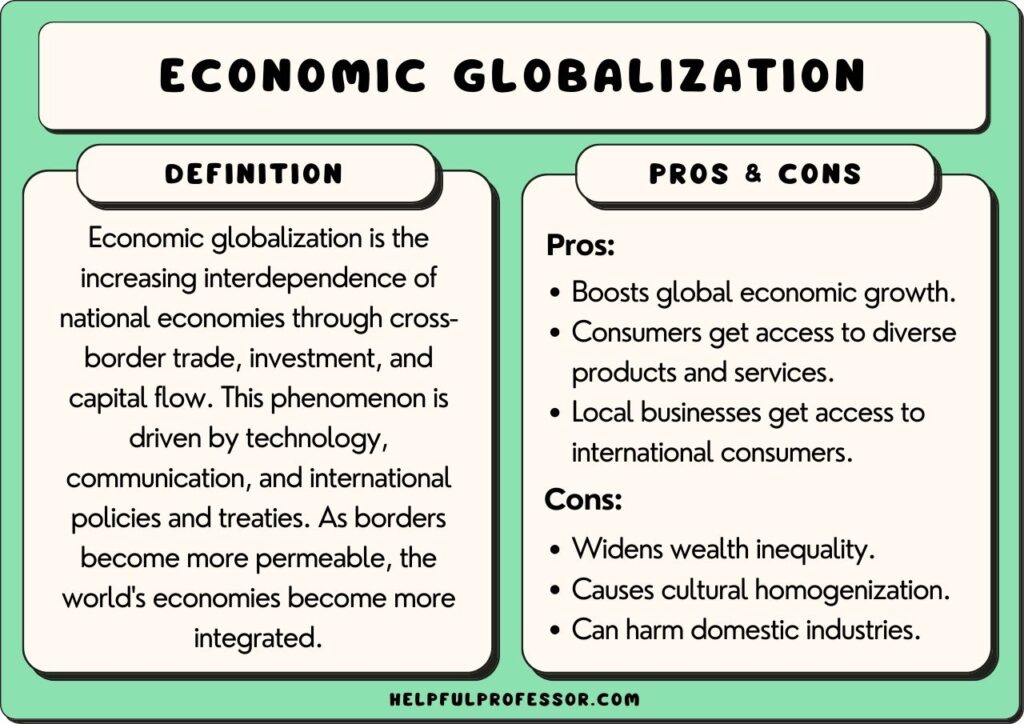
Economic globalization is one of 8 types of globalization . It refers to the ways in which global economies have become integrated through growing business, trade and financial interdependence.
Elements of economic globalization include:
- Rise of Multinational Corporations
- Movement of Manufacturing Industries to Developing Nations
- Growth of Financial Hub Cities in Developed Nations
While we usually refer to modern examples of economic globalization (as it is more extreme than ever), the globalization of our economies has been going on for centuries. An example of this is the rise of the tea trade from India to England facilitated by the East India Company that was founded in 1600.
There have been both positive and negative effects of the economic integration of the world’s economies. A positive is increased prosperity of the world overall. A negative is the widening gap between the rich and poor.
Economic Globalization
Definition & simple explanation.
Economic globalization is the element of globalization concerned with how our economies have become increasingly interconnected. As our world has become more interconnected (thanks to faster movement of goods and people as well as high-speed telecommunications), businesses have made the most of this to engage in cross-border commerce.
Economic integration includes the integration of:
- Goods – Including the production and sale of products and their parts across international borders.
- Services – Including increased movement of labor and the growth of international service providers such as call centers moving overseas.
This integration sped up toward the second half of the 20 th Century and its growth continues to this day.
Examples of Economic Globalization
Examples include:
1. Rise of Multinational Corporations Multinational corporations include Coca-Cola, McDonalds, Amazon and Google. Globalization of economies has often allowed multinational corporations to move to offshore tax havens and low-tax nations to minimize their tax responsibilities to society.
Multinational corporations have existed for centuries. The East India Company, for example, (established in 1600) used to trade teas and spices from Asia to Europe.
However, it has become increasingly easy for corporations to conduct international business thanks to tax treaties to help corporations avoid double taxation, free trade agreements such as NAFTA, and faster movement of goods and services.
Related Concept: McDonaldization
2. Internationalization of Capital Markets The growing ease with which companies (and individuals) can move money overseas has led to international capital markets. In short, this means companies overseas can fund businesses all around the world. This was labelled by Arjun Appadurai as ‘financescapes’.
Now, an entrepreneur can get cheap low-repayment funding from overseas to set up a business venture. Similarly, overseas buyers can flood a real estate market to buy up houses in international cities like Vancouver BC or Melbourne Australia. This can inflate housing prices for locals.
Similarly, Chinese industries have been quite aggressive in buying up farming land and industries around the world – which has led to some backlash from locals who feel as if local land should be owned by local people.
3. Movement of Manufacturing Overseas The past few decades have seen massive closing-down of manufacturing industries in developed nations. Those industries have been moved offshore, such as to Mexico, Vietnam and China, where labor regulations are sometimes less stringent and wages are lower.
Now, if you look at the label on your clothing or electronics, you’ll often see a “Made in China” label.
This has allowed us to get cheaper goods, but has led to backlash from activists who have seen entire industries for blue collar workers collapse in developed nations. Some could also claim the quality of the goods may be affected if manufactured in countries with lower quality standards.
4. Internationally Mobile Labor Forces White collar jobs in finance, engineering and related industries have benefited from globalisation. Those with in-demand skills can find work across the world before even stepping on an airplane and travel internationally for 12- to 36- month stints to conduct work overseas.
This concept of migration for work is not new. New world nations like the United States are built on movement of people seeking economic mobility. The major recent change has been the speed and ease with which this movement can happen for those with in-demand skills.
5. Rise of ‘Hub’ Cities As the globe’s economies have become increasingly intertwined, nations have developed expertise in specific industries. This is known as the development of ‘economies of scale’ and leads to improved productivity.
One consequence of this is that there are now hub cities around the world focused on particular industries. London is known as a finance hub, Los Angeles for technology (see also: technological globalization ), and Seattle for aviation.
6. Worldwide Booms and Busts A globalized economy means that each economy around the world is dependant on the success of others. Thus, a recession in one nation may have a flow-on effect and cause a recession in others. The Great Depression and the Global Financial Crisis are two examples where economic problems in one part of the world (such as the United States) can lead to economic woes all around the world.
Advantages of Economic Globalization
1. Cheaper Goods Multinational corporations can move their manufacturing industries overseas to nations where the cost of production is low.
2. Economies of Scale (Efficiency) Larger (multi-national) corporations can produce products in bulk. This can create economies of scale, which means the cost of goods goes down as the number of goods you produce goes up. For example, Wal-Mart can often get goods to market a lot cheaper than your local corner store.
3. Increased Prosperity Proponents of globalization say that it has increased overall prosperity in the world. When manufacturing industries move overseas, those people in those developing nations get jobs and can be lifted out of relative poverty, while people in the developed world get cheaper goods. This is the ‘rising tide lifts all boats’ argument. Critics disagree – and that’s discussed in the ‘disadvantages’ section below.
4. Cheap Money Entrepreneurs can get financed from international financiers (such as Chinese investors) at low interest rates. The large pool of potential investors in a global market means you can seek out very cheap money. It forces downward pressure on interest rates and makes it easier for you to borrow money to start a business.
Disadvantages of Economic Globalization
1. Loss of Manufacturing Jobs in Developed Nations Globalization inevitably leads to the movement of industries to achieve economies of scale. Manufacturing industries have been the biggest losers in recent decades. The NAFTA agreement, for example, led many US-based manufacturers to relocate to Mexico.
Widespread political backlash to loss of protected industries is evident around the world. Detractors argue for a return to nationalist and protectionist policies. One prime example is Brexit – the exit of the UK from the European Union – which was in part due to the loss of the fishing industry during the UK’s participation in the EU trade bloc.
> See Also: Political Globalization
2. Exploitation of Developing Nations Goods are cheaper to produce in developing nations because they often have lower wages and worker protections. The cheap goods that come out the other end – and end up on our doorstep – are often produced in sweatshops for extremely low wages with few days off, rest breaks, or safety standards.
Here, there is a debate between the fact developing nations are asking for these jobs (the countries often have high unemployment) and the fact we have to be responsible consumers who don’t exploit nations that do not have worker protections.
3. International Interdependence Critics of globalization say that it’s led nations to be overly dependent on international supply chains. This was evident, for example, during the Covid-19 pandemic, when many developed nations were unable to produce vaccines. All their vaccine production facilities had moved overseas for cheaper labor.
Similarly, during war time, all nations need to be able to produce food and weapons within the nation to sustain them throughout the war. Many nations are unlikely to be able to do this today.
4. Tax Evasion The internationalization of the economy has allowed many companies to move offshore to avoid taxes. Some smaller nations the need tax revenue offer low-tax incentives for large corporations to move to their low-tax nations. Larger nations try to match these tax decreases, creating a global ‘race to the bottom’. The net effect of this is to lower corporate tax rates worldwide, leaving nations with less tax revenue to spend on social services.
5. Climate Change and Environmental Impacts An international economy could have significant bad effects on the environment. Goods have much greater distance to move, leading to greater carbon footprints for products. Some may also argue that products are also lower quality, meaning they get trashed sooner – leading to greater amounts of landfill. Lastly, multinational companies can avoid environmental responsibilities by operating in nations with relaxed environmental laws – again leading to ecological damage.
Related: Cultural Globalization Pros and Cons
Economic globalization has been occurring for centuries, but has grown significantly in recent years thanks to trade liberalization and increasing speed of communication and travel. We now live in an integrated global economy that is heavily interdependent.
There are some great advantages of economic globalization such as cheaper goods, economies of scale, and the spread of valuable consumer goods around the world. But there are also some significant downsides also, such as potential for exploitation of labor in developing nations and the loss of working-class jobs in developed nations.
Cavanagh, J. (2004). Alternatives to economic globalization: A better world is possible . New York: Berrett-Koehler Publishers.
Gallagher, K. P. (2009). Economic globalization and the environment. Annual Review of Environment and Resources , 34 , 279-304.
Sachs, J. D. (2020). The Ages of Globalization: Geography, Technology, and Institutions . United States: Columbia University Press.
Sen, S., & Barry, C. M. (2020). Economic globalization and the economic policy positions of parties . Party Politics , 26 (2), 154-164.
Steger, M. B. (2017). Globalization: A very short introduction (Vol. 86). England: Oxford University Press.
Ying, Y. H., Chang, K., & Lee, C. H. (2014). The impact of globalization on economic growth . Romanian Journal of Economic Forecasting , 17 (2), 25-34.

Chris Drew (PhD)
Dr. Chris Drew is the founder of the Helpful Professor. He holds a PhD in education and has published over 20 articles in scholarly journals. He is the former editor of the Journal of Learning Development in Higher Education. [Image Descriptor: Photo of Chris]
- Chris Drew (PhD) https://helpfulprofessor.com/author/chris-drew-phd/ 5 Top Tips for Succeeding at University
- Chris Drew (PhD) https://helpfulprofessor.com/author/chris-drew-phd/ 50 Durable Goods Examples
- Chris Drew (PhD) https://helpfulprofessor.com/author/chris-drew-phd/ 100 Consumer Goods Examples
- Chris Drew (PhD) https://helpfulprofessor.com/author/chris-drew-phd/ 30 Globalization Pros and Cons
Leave a Comment Cancel Reply
Your email address will not be published. Required fields are marked *
More From Forbes
The pros and cons of globalization.
- Share to Facebook
- Share to Twitter
- Share to Linkedin
A story in the Washington Post said “20 years ago globalization was pitched as a strategy that would raise all boats in poor and rich countries alike. In the U.S. and Europe consumers would have their pick of inexpensive items made by people thousands of miles away whose pay was much lower than theirs. And in time trade barriers would drop to support even more multinationals expansion and economic gains while geo political cooperation would flourish.”
There is no question that globalization has been a good thing for many developing countries who now have access to our markets and can export cheap goods. Globalization has also been good for Multi-national corporations and Wall Street. But globalization has not been good for working people (blue or white collar) and has led to the continuing deindustrialization of America.
Globalization is a complicated issue. It is necessary to evaluate the pros and cons before drawing any conclusions.
Supporters of globalization argue that it has the potential to make this world a better place to live in and solve some of the deep-seated problems like unemployment and poverty.
1. Free trade is supposed to reduce barriers such as tariffs, value added taxes, subsidies, and other barriers between nations. This is not true. There are still many barriers to free trade. The Washington Post story says “the problem is that the big G20 countries added more than 1,200 restrictive export and import measures since 2008
2. The proponents say globalization represents free trade which promotes global economic growth; creates jobs, makes companies more competitive, and lowers prices for consumers.
3. Competition between countries is supposed to drive prices down. In many cases this is not working because countries manipulate their currency to get a price advantage.
4. It also provides poor countries, through infusions of foreign capital and technology, with the chance to develop economically and by spreading prosperity, creates the conditions in which democracy and respect for human rights may flourish. This is an ethereal goal which hasn’t been achieved in most countries
5. According to supporters globalization and democracy should go hand in hand. It should be pure business with no colonialist designs.
6. There is now a worldwide market for companies and consumers who have access to products of different countries. True
7. Gradually there is a world power that is being created instead of compartmentalized power sectors. Politics is merging and decisions that are being taken are actually beneficial for people all over the world. This is simply a romanticized view of what is actually happening. True
8. There is more influx of information between two countries, which do not have anything in common between them. True
9. There is cultural intermingling and each country is learning more about other cultures. True
10. Since we share financial interests, corporations and governments are trying to sort out ecological problems for each other. – True, they are talking more than trying.
11. Socially we have become more open and tolerant towards each other and people who live in the other part of the world are not considered aliens. True in many cases.
12. Most people see speedy travel, mass communications and quick dissemination of information through the Internet as benefits of globalization. True
13. Labor can move from country to country to market their skills. True, but this can cause problems with the existing labor and downward pressure on wages.
14. Sharing technology with developing nations will help them progress. True for small countries but stealing our technologies and IP have become a big problem with our larger competitors like China.
15. Transnational companies investing in installing plants in other countries provide employment for the people in those countries often getting them out of poverty. True
16. Globalization has given countries the ability to agree to free trade agreements like NAFTA, South Korea Korus, and The TPP. True but these agreements have cost the U.S. many jobs and always increase our trade deficit
• The general complaint about globalization is that it has made the rich richer while making the non-rich poorer. “It is wonderful for managers, owners and investors, but hell on workers and nature.”
• Globalization is supposed to be about free trade where all barriers are eliminated but there are still many barriers. For instance161 countries have value added taxes (VATs) on imports which are as high as 21.6% in Europe. The U.S. does not have VAT.
• The biggest problem for developed countries is that jobs are lost and transferred to lower cost countries.” According to conservative estimates by Robert Scott of the Economic Policy Institute, granting China most favored nation status drained away 3.2 million jobs, including 2.4 million manufacturing jobs. He pegs the net losses due to our trade deficit with Japan ($78.3 billion in 2013) at 896,000 jobs, as well as an additional 682,900 jobs from the Mexico –U.S. trade-deficit run-up from 1994 through 2010.”
• Workers in developed countries like the US face pay-cut demands from employers who threaten to export jobs. This has created a culture of fear for many middle class workers who have little leverage in this global game
• Large multi-national corporations have the ability to exploit tax havens in other countries to avoid paying taxes.
• Multinational corporations are accused of social injustice, unfair working conditions (including slave labor wages, living and working conditions), as well as lack of concern for environment, mismanagement of natural resources, and ecological damage.
• Multinational corporations, which were previously restricted to commercial activities, are increasingly influencing political decisions. Many think there is a threat of corporations ruling the world because they are gaining power, due to globalization.
• Building products overseas in countries like China puts our technologies at risk of being copied or stolen, which is in fact happening rapidly
• The anti-globalists also claim that globalization is not working for the majority of the world. “During the most recent period of rapid growth in global trade and investment, 1960 to 1998, inequality worsened both internationally and within countries. The UN Development Program reports that the richest 20 percent of the world's population consume 86 percent of the world's resources while the poorest 80 percent consume just 14 percent. “
• Some experts think that globalization is also leading to the incursion of communicable diseases. Deadly diseases like HIV/AIDS are being spread by travelers to the remotest corners of the globe.
• Globalization has led to exploitation of labor. Prisoners and child workers are used to work in inhumane conditions. Safety standards are ignored to produce cheap goods. There is also an increase in human trafficking.
• Social welfare schemes or “safety nets” are under great pressure in developed countries because of deficits, job losses, and other economic ramifications of globalization.
Globalization is an economic tsunami that is sweeping the planet. We can’t stop it but there are many things we can do to slow it down and make it more equitable.
What is missing?
Leadership – We need politicians who are willing to confront the cheaters. One of our biggest problems is that 7 of our trading partners manipulate their currencies to gain unfair price advantage which increases their exports and decreases their imports. This is illegal under WTO rules so there is a sound legal basis to put some kind of tax on their exports until they quit cheating.
Balanced Trade – Most of our trading partners can balance their trade budgets and even run a surplus. We have not made any effort to balance our trade budget and have run a deficit for more than 30 years resulting in an $11 trillion deficit. The trade deficit is the single biggest job killer in our economy, particularly manufacturing jobs. We need the government to develop a plan to begin to balance our trade deficit even though this is not a political priority in either party.
Trade Agreements – Both the NAFTA and the South Korean Korus trade agreements might have been good for Wall Street and the multi-national corporations but they eliminated jobs in America and expanded our trade deficit. The upcoming Trans Pacific Trade Agreement will do the same thing and Congress should not fast track this bad agreement for a dozen reasons.
Enforcing the rules – China ignores trade rules and WTO laws with reckless abandon. Besides currency manipulation they subsidize their state owned companies to target our markets, and provide funding to their state owned companies that dump their products in America. They also steal our technologies, sell counterfeit versions of our products, and impose tariffs and other barriers anytime they want - as we do nothing to stop them. China does not deserve to be on our most favored nation list and we need to tax their exports to us until they stop these illegal activities.
What is good for third world countries, like Kenya, or countries with tremendous growth, like China, has not been good for American workers. Globalization is deindustrializing America as we continue to outsource both manufacturing blue collar and white collar jobs. Supporters of globalization have made the case that it is good because it has brought low priced imported goods, but they have not matched the decline of wages in the middle class and will not offset the loss of many family wage jobs
Globalization is like being overwhelmed by a snow avalanche. You can’t stop it – you can only swim in the snow and hope to stay on top. I would like to make the argument that the US should try a lot harder to swim in the snow and stay on top. We can’t stop globalization but there are many policies and strategies we can use to make it more equitable. We can enforce the trade laws, force the competition to play by the same rules, and stop giving our competitors the tools (technology and R& D) to ultimately win the global war.
Mike Collins is the author of Saving American Manufacturing. His website is www.mpcmgt.com.
- Editorial Standards
- Reprints & Permissions
Globalization Essay: Pros And Cons
About 10 or 20 years ago not so many people heard about globalization, and only few knew what it means. Today globalization issue is discussed by almost everyone. A lot of journalists, writers, and just ordinary people have already written numerous globalization essays, in which they highlight different aspects of this phenomenon. Contingently all the essays on globalization can be divided into 2 groups: the first group supports globalization and tells about its advantages, the second one is against it and emphasizes its weak points. In this essay on globalization we try to remain neutral and to show you both pros and cons.
The concept of “globalization” is very multifaceted. In simple words globalization is a process of the world transformation into a unified system. In the end of the last century globalization became actual topic for thinking; discussions about it did not stop but strengthened instead. Globalization implies the integration of the economic, cultural, political and religious spheres, however, the most sensational is globalization of the economy.
Combining of space in one zone and unlimited movement in it of information resources, funds, labor, goods and services, the free expression of ideas, the development, strengthening and interaction of social institutions – all these form the world economic globalization.
Sources of globalization
1. Scientific and technical progress, in particular the development of the Internet, by means of which the distance between countries is erased. Today we have the possibility to get news from any place of the world, as soon as they occur, watch images and video from satellites in real time. It has also become available distance learning in educational institutions of any country.
2. World trade, which has become much freer as a result of liberal measures. Thanks to the taken measures tariffs on trade in goods and services from abroad reduced.
3. Transnationalization, which in essence is an exchange between the countries of the goods, which in one country are in abundance, and in another there is a lack of those goods. Multinational companies today captured financial and information market. The economies of all countries are becoming a global.
4. The transition to a market relations, which is more or less occurred in Europe and the former Soviet Union, and thus supported the economic views of the United States.
5. Union of the cultural traditions. The media are becoming homogeneous and globalized. English has become the international language, as in former times Russian was main for the countries of the USSR.
1. Globalization has created an international competition. Competition, in its turn, is a stimulator of the production, as much it is harder as much the level of production is higher. After all, every manufacturer tries to occupy a favorable place in international trade field, so he tries to do everything so that his goods look more attractive than the competitors’.
2. Globalization has provoked economy of industrial scale, which contributed to avoiding shocks in the economy and to lower prices.
3. International trade is beneficial to all the subjects of market relations; creation of trade unions only accelerates the process of globalization.
4. The introduction of modern technology improves productivity.
5. Countries in the development stage can catch up with the advanced state, globalization gives them a head start to improve their economic situation and take strong foothold on the world stage.
1. Benefits of globalization can not be equally distributed across the world. Some industrial sectors from international trade make huge profits, the inflow of skilled labor force from abroad, the financing, while others are losing competitiveness, become unnecessary. Forgotten industries need time and money to reconstruct, to adjust to the new conditions of life. Often they do not manage to do it, so the owners lose their money, people lose their work. These changes greatly hurt the national economy of each country, make changes in the economic structure, and the unemployment rate increases.
2. The de-industrialization of the economy. The manufacturing sector loses its ground, while its place takes the thriving service industry. People have to train for a new profession to find their place in this global changing system.
3. Competition creates a large gap between qualified and no qualified personnel. Salary of the first ones increases significantly, while the second receive a penny or even lose their source of income. This again raises the unemployment, which undermines globalization. But at the same time it is also a good incentive for people to train, develop and acquire a qualification.
4. Globalization has a significant impact on the ecosystem of the world. Conflicts over the use of natural resources can not be avoided. The world is already on the verge of tremendous discord caused by deforestation, pollution of the oceans and seas, and the irrational use of the goods of the Earth.
All this can cause irreparable harm to humanity and the planet as a whole.
Globalization is a fact of modern life; it is an irreversible process, inescapable fate of world development. Globalization can not be good or bad.
So let’s sum up everything we have already mentioned. Globalization is a world phenomenon; it is a process that affects every country of the world, their economies and the lives. On the one hand it unites the whole world, on the other hand globalization makes the line between developed and backward countries more apparent. The competition, which affects really all areas of production, is the main globalization engine on the world market. Only those companies that are able to compete can survive. The biggest globalization disadvantage is that backward countries will suffer the most, as they will not be able to take their place on the global market.
Now having read this essay about globalization you are able to form your own valid view on this issue. We have other essays for you on various topics. Visit our website and you will find everything you need. Also our qualified team can help you any time. On Bigessaywriter.com you are always welcome!
- Terms of Use
- Privacy Policy

- Writing Correction
- Online Prep Platform
- Online Course
- Speaking Assessment
- Ace The IELTS
- Target Band 7
- Practice Tests Downloads
- IELTS Success Formula
- Essays Band 9 IELTS Writing Task 2 samples – IELTS Band 9 essays
- Essays Band 8 IELTS Writing – samples of IELTS essays of Band 8
- Essays Band 7 IELTS Writing – samples of IELTS essays of Band 7
- Essays Band 6 IELTS Writing – samples of IELTS essays of Band 6
- Essays Band 5 IELTS Writing – samples of IELTS essays of Band 5
- Reports Band 9 IELTS Writing – samples of IELTS reports of Band 9 (Academic Writing Task 1)
- Reports Band 8 IELTS Writing – samples of IELTS reports of Band 8
- Reports Band 7 IELTS Writing – samples of IELTS reports of Band 7
- Letters Band 9 IELTS Writing Task 1 – samples of IELTS letters of Band 9
- Letters Band 8 IELTS Writing – samples of IELTS letters of Band 8
- Letters Band 7 IELTS Writing – samples of IELTS letters of Band 7
- Speaking Samples
- Tests Samples
- 2023, 2024 IELTS questions
- 2022 IELTS questions
- 2021 IELTS questions
- 2020 IELTS questions
- High Scorer’s Advice IELTS high achievers share their secrets
- IELTS Results Competition
- IELTS-Blog App
IELTS Essay, topic: The advantages and disadvantages of globalization
- IELTS Essays - Band 8
Even though globalization affects the world’s economies in a very positive way, its negative side should not be forgotten. Discuss.
Globalization is such a commonly used term in the century. It simply means that the world has become integrated economically, socially, politically and culturally through the advances of technology, transportation and communication. It is undeniable that globalization has resulted in both positive and negative effects which must be addressed accordingly.

Secondly, several companies from the more developed countries have already ventured to establish foreign operations or branches to take advantage of the low cost of labor in the poorer countries. This kind of business activity will provide more influx of cash or investment funds into the less developed countries.
However, one cannot deny the negative effects which derived from globalization. One crucial social aspect is the risk and danger of epidemic diseases which can easily be spread as the transportation becomes easier and faster in today’s advanced society. This is evidenced in the recent birds flu disease which has infected most Asian countries over a short period of time.
As large corporations invest or take over many offshore businesses, a modern form of colonization will also evolve which may pose certain power pressure on the local governments of the less developed countries. Unemployment rates in the more developed regions such as Europe may also escalate as corporations choose to outsource to the cheaper work force from Asian countries.
In conclusion. to reiterate that globalization is inevitable and we must urge individuals, companies and governments to use a more balanced approach by taking the appropriate steps to deal with matters relating to the financial or economical gains verses the social, political or ecological concerns of the world.
This essay is too long, 318 words instead of 250-265. Otherwise (except for some minor grammatical errors) it is a very nice work. It covers the task, has the right structure, the paragraphs are coherent and are logically connected by elegantly used linking words, the structure of sentences is fine and so is your vocabulary. Seems worthy of Band 7.5 or 8.
Click here to see more IELTS essays of band 8
Related posts:
- IELTS essay, topic: Some say that new homes should be constructed in existing cities while others argue that new towns should be built (advantages/disadvantages) Many countries are experiencing population growth and need to build...
- IELTS essay, topic: The advantages and disadvantages of high-rise apartment living This is a model response to a Writing Task 2...
- IELTS Band 9 essay, topic: Some schools insist that students have laptops in class (advantages / disadvantages) This is a model response to a Writing Task 2...
- IELTS Essay, topic: In some countries private cars are now banned from city centres (advantages / disadvantages) This is a model response to a Writing Task 2...
- IELTS essay, topic: Many university students nowadays live away from home and their parents (advantages/disadvantages) This essay topic was seen in a recent IELTS test...
8 thoughts on “IELTS Essay, topic: The advantages and disadvantages of globalization”
Pingback: IELTS Essay Samples of Band 8 | IELTS-Blog
Can i send my essay for review?
Hi Sawraj, yes of course, you’re welcome to send us your essays for review. Please visit this page to learn how to do it.
This is awesome effort.
Hlo may I snd my essay for review Plzz
Hi Harpreet, to send you essay for correction please visit this page , make a payment and we will send you some easy instructions how to send your task to our teachers.
Leave a Reply
Your email address will not be published. Required fields are marked *
Save my name, email, and website in this browser for the next time I comment.
Home — Essay Samples — Sociology — Globalization
Essays on Globalization
Hook examples for globalization essays, "the global village" metaphor hook.
"In the age of globalization, our world has transformed into a 'global village.' Explore the implications of this metaphor and how it has reshaped our understanding of interconnectedness and cultural exchange."
The Impact of Digital Connectivity Hook
"In an era where a single tweet can reach millions, digital connectivity has revolutionized globalization. Delve into the profound impact of the internet, social media, and technology on global interactions."
The Paradox of Local vs. Global Hook
"Globalization blurs the lines between local and global identities. Analyze the paradox of preserving cultural heritage while embracing the globalized world and how this tension shapes our societies."
The Global Marketplace Hook
"Globalization has ushered in an era of unprecedented trade and economic interconnectedness. Explore the dynamics of the global marketplace, from multinational corporations to supply chains spanning continents."
Cultural Fusion and Identity Hook
"Globalization has led to a melting pot of cultures, but what happens to cultural identities in the process? Investigate how globalization impacts the preservation and evolution of cultural identities."
The Challenges of Globalization Hook
"While globalization offers numerous benefits, it also presents challenges. Examine issues such as income inequality, cultural homogenization, and environmental concerns that arise in a globalized world."
The Future of Globalization Hook
"As we stand on the brink of a globalized future, what can we expect? Join me in exploring the potential trajectories of globalization, from its impact on politics to the role of emerging technologies."
The Best Globalization Essay Topics
- The Impact of Globalization on Local Cultures: Integration or Erasure?
- The Impact of Globalization on Cultural Identity in Anthropological Studies
- Globalization and Economic Inequality: Bridging the Gap Between Rich and Poor
- The Role of Technology in Advancing Globalization and Its Social Implications
- Environmental Consequences of Globalization: Challenges and Sustainable Solutions
- Analyzing the Advantages and Disadvantages of Globalization
- The Influence of Globalization on Education and Cross-Cultural Exchanges
- Global Political Dynamics: How Globalization Affects Sovereignty and Governance
- Globalization and Health: The Spread of Diseases and Global Health Initiatives
- Consumer Culture and Globalization: The Homogenization of Global Markets
Sociological Imagination Am I Supposed to
Multicultural challenges and integration policies, made-to-order essay as fast as you need it.
Each essay is customized to cater to your unique preferences
+ experts online
Advantages and Disadvantages of Globalization
The effects of globalization on developing countries and its advantages and disadvantages, the impact of globalization to cultural identity, globalization, its causes and effects on the world, let us write you an essay from scratch.
- 450+ experts on 30 subjects ready to help
- Custom essay delivered in as few as 3 hours
Good and Bad Impact of Globalization
History of globalization and its benefits for society, financial, social and political effects of globalization, globalization: global concerns of global development, get a personalized essay in under 3 hours.
Expert-written essays crafted with your exact needs in mind
Globalization's Theories and Effects in The Modern World
The effects of globalization on health and medicine, a study on globalization and its various sides, overview of five articles about globalization, globalization: two sides of the arguments both for and against, globalization and its positive and negative sides for india, the advantages and disadvantages of the globalization process based on real-life examples, criticism and controversial benefits of globalization, globalization: importance of english nowadays, the impact of globalization, nationalism and protectionism on india, an overview of the overall impact of globalization, research of effects of globalization on the media in the world, globalisation as an economical, political and cultural process, pro globalist and anti globalist view from developed country perspective, how global issues impact individual states, electronic commerce in the globalization era, the effect of globalization and americanization on mass media, components of globalization: concept sociocultural and social globalizations, how the impact of globalization on illicit drug trafficking has affected international security, discussion of whether globalization is good or bad for the indian economy.
1. Halliday, T. C., & Osinsky, P. (2006). Globalization of law. Annu. Rev. Sociol., 32, 447-470. (https://www.annualreviews.org/doi/abs/10.1146/annurev.soc.32.061604.123136) 2. Fischer, S. (2003). Globalization and its challenges. American Economic Review, 93(2), 1-30. (https://www.aeaweb.org/articles?id=10.1257/000282803321946750) 3. Lang, M. (2006). Globalization and its history. The Journal of Modern History, 78(4), 899-931. (https://www.journals.uchicago.edu/doi/abs/10.1086/511251?journalCode=jmh) 4. Spring, J. (2008). Research on globalization and education. Review of educational research, 78(2), 330-363. (https://journals.sagepub.com/doi/abs/10.3102/0034654308317846?journalCode=rera) 5. Scott, A., & Storper, M. (2003). Regions, globalization, development. Regional studies, 37(6-7), 579-593. (https://www.tandfonline.com/doi/abs/10.1080/0034340032000108697a) 6. Jameson, F. (1998). Notes on globalization as a philosophical issue. In The cultures of globalization (pp. 54-78). Duke University Press. (https://www.degruyter.com/document/doi/10.1515/9780822378426-005/html?lang=de) 7. Frankel, J. A. (2003). The environment and globalization. (https://www.nber.org/papers/w10090) 8. Teeple, G. (2000). What is globalization?. Globalization and its discontents, 9-23. (https://link.springer.com/chapter/10.1057/9780333981610_2)
Relevant topics
- Sociological Imagination
- Modern Society
- Social Change
- Stereotypes
- Sociological Perspective
- American Identity
- Effects of Social Media
- Media Analysis
- Cultural Appropriation
By clicking “Check Writers’ Offers”, you agree to our terms of service and privacy policy . We’ll occasionally send you promo and account related email
No need to pay just yet!
Bibliography
We use cookies to personalyze your web-site experience. By continuing we’ll assume you board with our cookie policy .
- Instructions Followed To The Letter
- Deadlines Met At Every Stage
- Unique And Plagiarism Free
- AI Translation
- AI quality assurance
- Collaborative translation
- Localization workflow management
- Localization process automation
- Translation quality assurance
- In-context editing
- Translation services
- Real-time support translation
- Lokalise apps
- For developers
- For product managers
- For localization managers
- For translators
- For designers
- For marketers
- For customer service
- For enterprise
- Developer Hub
- API reference
- Flutter SDK
- Android SDK
- File-formats
- Build an app
- Developer tools
- Case studies
- Product updates
- Documentation
- Try it free
- Localization
- Inside Lokalise
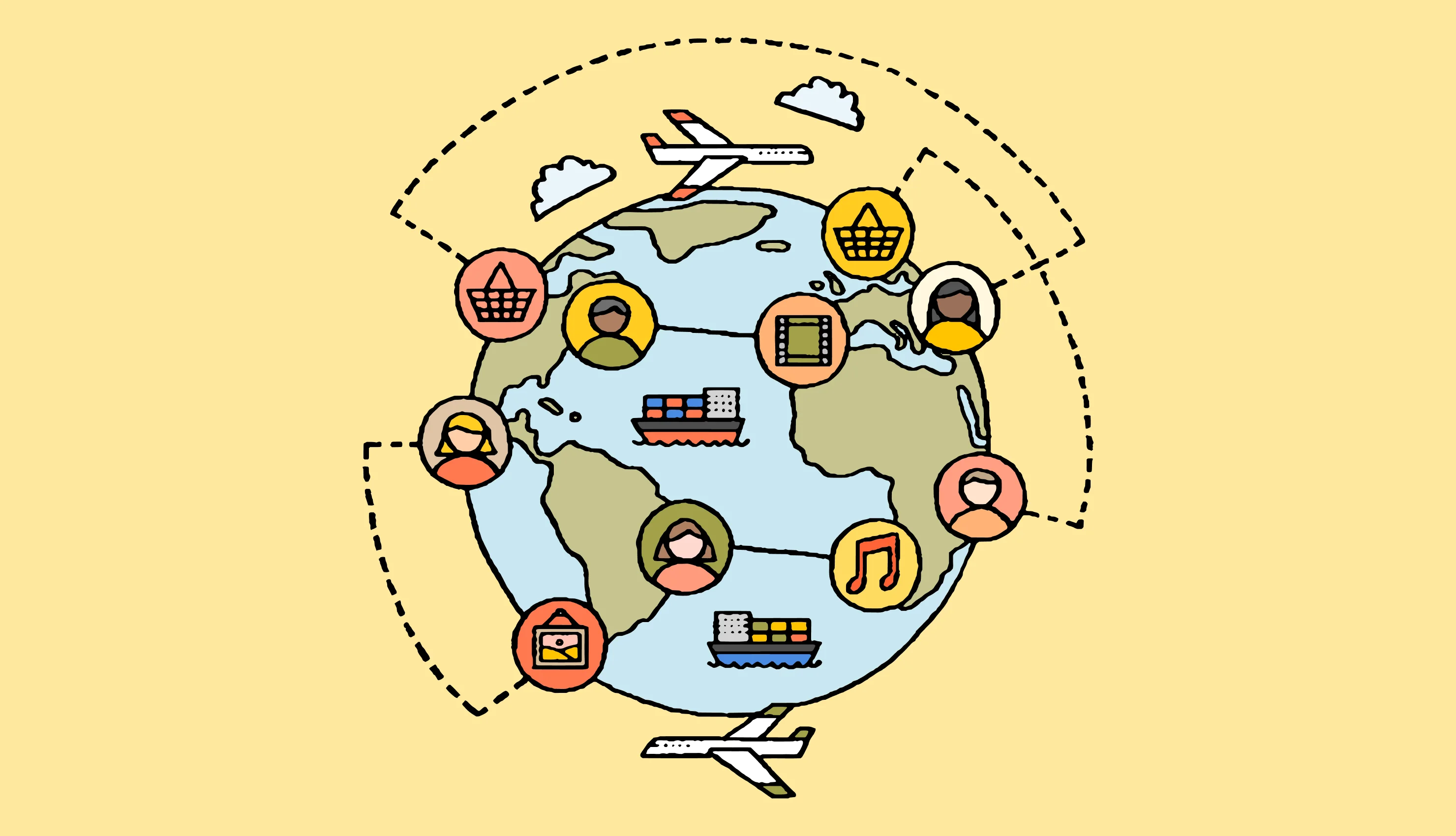
Globalization: the pros and cons, & the future of an interconnected (or disconnected) world
Global trade in online services and goods is booming, despite globalization being under fire in many nations .
Brexit, COVID-19, Trump’s trade war with China, and the war in Ukraine, have left many wondering if we’re entering a phase of deglobalization – a world destined to become less connected, with countries looking inwards instead of outwards.
Some welcome this movement, citing vulnerabilities of global supply chains exposed during the pandemic and the Russia-Ukraine conflict. Others believe the positive outcomes of globalization far outweigh the negatives. And those on the bench believe globalization should be redefined.
To help you understand why there’s so much debate over globalization, we’ll go over both the positives and negatives later on in this article. First, let’s go over the definition of globalization.
What is globalization?
Globalization describes how the world’s cultures and economies are connected and dependent on each other. Through trade agreements between countries, globalization allows businesses to buy and sell across borders with lower tariffs and no or fewer limits on imports and exports. Overall, the goal of governments in favor of globalization is to make it easier to do business worldwide.
Did you know? The opposite of globalization is protectionism, which restricts international trade and forces companies and consumers to buy home-grown goods and services.
Fun fact about glocalization
Nope, not a typo! Glocalization should not be mistaken for globalization. It’s a combination of globalization and localization . While globalization is the process of expanding business operations on a worldwide scale, localization is the process of adapting products, services, and marketing to meet the specific needs of local markets.
When you merge the two, you get glocalization. The concept represents a global and local approach with companies maintaining a global brand identity that’s more universally accepted, while also adapting products or services to suit local markets.
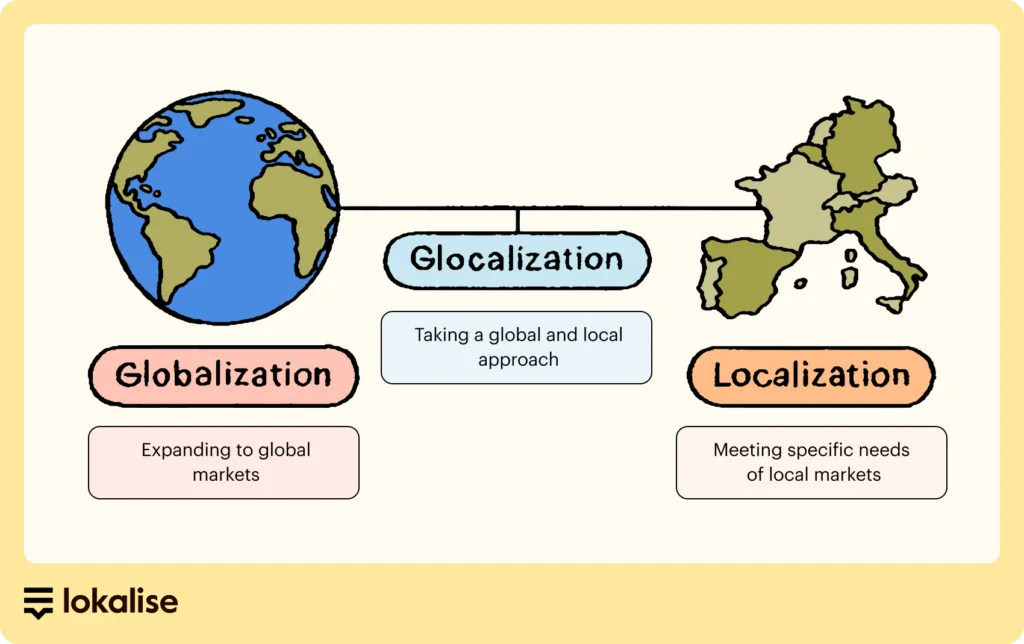
What are the advantages of globalization?
International trade is a key driver of globalization, and so we often focus on the trade benefits of globalization. But globalization also brings with it social, political, legal, and cultural benefits. Let’s go over some of these below.
Expansion into other markets
Great ideas and products are no longer confined to local markets. Businesses can expand freely to new regions, offering their products and services to a larger audience. They can also set up operations in regions where the cost of production and employment is lower, allowing them to lower manufacturing and labor costs and be more competitive.
Globalization not only benefits companies, but also customers who have access to a larger variety of products, leading to more choices, better quality (because companies need to compete), and more affordable products.
The language gap gets smaller
With more and more companies going global, the language gap is getting smaller. Companies are communicating with customers in their native language to better connect with them and create fairer and more personal experiences.
Twenty years ago, there was no way of knowing which brand was doing the best job at going global from a website perspective , as global researcher John Yunker, explains it. Communicating in other languages wasn’t something that everyone was doing back then, and so there was no blueprint to follow. This is why John created the Web Globalization Report Card (below) to measure who was doing the best job at going global.
The W eb Globalization Report Card scores global websites based on:
- Internationalization (i18n) – the flexibility of global website architecture
- Localization – the level that content has been adapted for local audiences
- Global navigation – can the user find their locale or localized site?
- Global reach – how many languages are available?
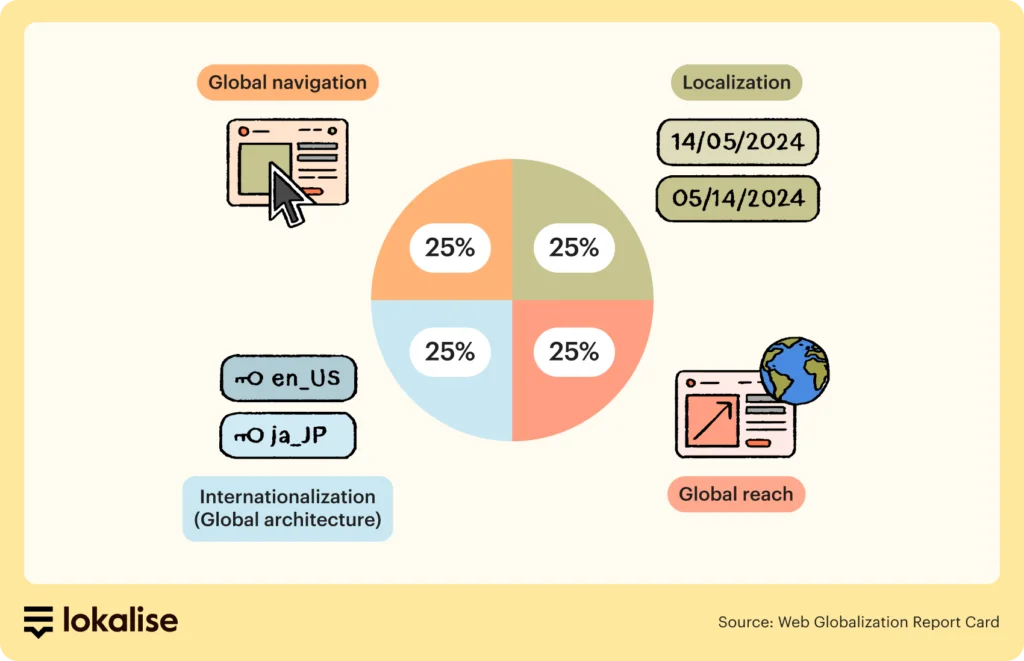
During John’s research, Google emerged as the best global website. It was the most multilingual website on the internet with 67 languages, and has become a benchmark for the rest of the world.
I n 2024, the two most linguistically fluent websites on the internet are not-for-profit organizations: The Jehovah’s Witnesses (over 1000 languages!) and Wikipedia (339 languages).
Going global? Learn how to successfully translate your website
Access to a diverse pool of talent
More and more companies operate remotely and hire globally. The big benefit is that they can tap into a vast pool of talent, bringing diverse perspectives and skills to the table. Some countries are making it even easier for so-called digital nomads to work remotely by offering temporary visas, which is reshaping local economies and becoming yet another symbol of globalization.

Transfer of technology and knowledge-sharing
Opening up borders can lead to greater innovation, breakthroughs, and growth. Though most of us want to leave COVID-19 well behind us, we need only look at the response from countries who came together to create the first vaccines in less than a year. Vaccines normally take around 5 to 10 years to create , but the deadliness, rapid spread, and disruptiveness of COVID-19 led to a new global approach to vaccine development, manufacturing, and distribution.
Access to new cultures
Globalization has made it easier to explore, learn, and be inspired by new cultures. Without the freedom to work abroad, travel across borders, and do business internationally, we wouldn’t be exposed to new ideas, products, and services. Our choices would be limited to what’s available in the countries we live in. Imagine not having access to music, food, and movies from other parts of the world!
What are the disadvantages of globalization?
Globalization doesn’t have all the answers. Where the scales tip in favor of economic growth and technological advancements, they weigh heavily with concerns over economic inequality and environmental issues. Let’s go over some of these downsides in more detail.
Cultural homogenization
Dominant cultures from other countries often influence local culture, leading to a more uniform global culture. This raises concerns about losing unique local identities, traditions, brands, languages, and cultures as locals adapt to global markets.
Financial crises and inequality
While globalization has been shown to decrease poverty overall, it’s often at the expense of local businesses and populations. Lower-priced foreign competition has led to job losses in developed nations, especially in domestic manufacturing, and exploitative labor practices in the developing world.
Globalization can also widen the inequality gap, with the rich becoming richer and the poor becoming poorer. Let’s take the modern-day example of globalization as an example: digital nomadism. This phenomenon has been blamed for rising house prices in some countries. Digital nomads are drawn to countries where living costs are low, allowing them to afford better lifestyles and save more. But this in turn sees prices in the region soar, and prices locals out of property, food, and more.
Environmental toll
Environmental degradation is common in countries where regulations are more relaxed. Projects like the construction of hydropower dams and deforestation in the name of globalization have caused environmental harm and habitat destruction. Meanwhile, global integration has led to a decrease in biodiversity and the spread of invasive species, impacting agriculture, wildlife, and ecosystems worldwide.
Supply chain vulnerabilities
Stretched supply chains make the world more susceptible to disruptions. Highlighted by the pandemic, US and China trade disputes, and more recently Russia’s war against Ukraine. The latter caused global disruptions to natural gas supplies and saw a spike in energy prices, while the ongoing spat between China and the US continues to see sanctions on exports and imports from both sides, which is disrupting global supply chains for companies.
Disruptions are not just man-made, however. Natural disasters can also be huge disruptors. Taiwan, for example, the largest manufacturer of semiconductors for large tech firms like Apple , is prone to typhoons and earthquakes.
Examples of globalization
Now that you understand the positives and negatives of globalization, let’s take a look at some examples of how globalization can show up in many different ways.
Brand and product globalization
Brands that sell their products and services in multiple countries often influence cultures and even economies on a global scale. Companies like, Coca-Cola, Nike, and McDonald’s have become ubiquitous symbols of American culture worldwide. Car companies, like Toyota – the world’s largest motor vehicle manufacturer – creates jobs and spur technological growth. Barbie, the most iconic toy doll, has influenced popular culture around the world. She’s inspired fashion, beauty standards, career choices, and trends.
These are examples of globalized brands that have universal appeal. Their brand, messaging, and products need to be consistent across markets and localized to make sure they resonate with consumers in individual markets.
Fun fact: you won’t find a McDonald’s in Iceland, where locals boycotted the hamburger chain in favor of their local burger joint.
Website globalization
As the number of brands going global continues to rise, we’ll continue to see an increase in website globalization – websites that are designed for a wider spectrum of markets . The average number of languages supported by global brands in 2024 is 34 . But there’s still a language gap.
The Website Globalization Report Card revealed that to communicate with over 90% of internet users, websites will need to support 50 or more languages. To make it easier to adapt websites for different markets, developers will need to internationalize their product’s code base. Think of internationalization as the globalization of digital products . You need to lay the foundations so your website is global-ready.
Cultural globalization
The economic interdependence of countries leads to cultural exports and exchange. Hollywood movies are a classic example, of bringing American culture to international audiences. Another more recent example is K-pop, a music genre popular in South Korea in the 90s, which has become a global cultural phenomenon.
Digital globalization
The internet is arguably the most significant technological example of digital globalization. That includes digital content and platforms, like websites, apps, and social media. It allows for real-time communication and access to information, regardless of geographical location.
Platforms like Facebook and Twitter have created virtual communities, where people from across the globe can connect, share, and unite people to support causes and movements. It brings people together more than ever and breaks down barriers of communication.
The future of globalization : finding the right balance
Right now, many people are on the fence about globalization.
The good news is that nations and corporations are reexamining their globalization strategies rather than reversing or ramping up their efforts. They’re finding new ways to adapt to the changing geopolitical landscape, including:
- Diversifying their manufacturing bases – a strategic move to strengthen supply chains. Some companies are even turning to locally sourced and manufactured solutions to help reduce environmental impact and support local economies.
- There’s talk about a Global Currency Reset , a theory investigating a new global currency
- Shifting from manufacturing to services, which play an increasingly important role in globalization
- Looking at sustainable supply chains with the need and demand for greener alternatives.
It seems more likely that globalization will evolve than reverse. By 2030, China and India are predicted to overtake the US as the world’s biggest economy, which will see a significant shift in the global economic landscape.
One thing is certain: recent and ongoing debates around globalization have highlighted how important it is to find the right balance of globalization for different regions.

Talk to one of our localization specialists
Book a call with one of our localization specialists and get a tailored consultation that can guide you on your localization path.
Related posts
Introducing lokalise ai: your personal localization assistant, how revolut maintains and launches new languages at scale with lokalise, how localization accelerates growth at three industry-leading tech companies, ukraine: a letter from our co-founders, carbon-neutral localization from lokalise, $50m – how we’ll invest it, using the same ios and android keys in multiplatform localization projects, learn something new every two weeks.
Get the latest in localization delivered straight to your inbox.

5 reasons why multi-language customer service is important
When you’re a business owner, nothing comes close to the disappointment and sometimes even rage of customers who are interested in purchasing your product or service, but are met with…
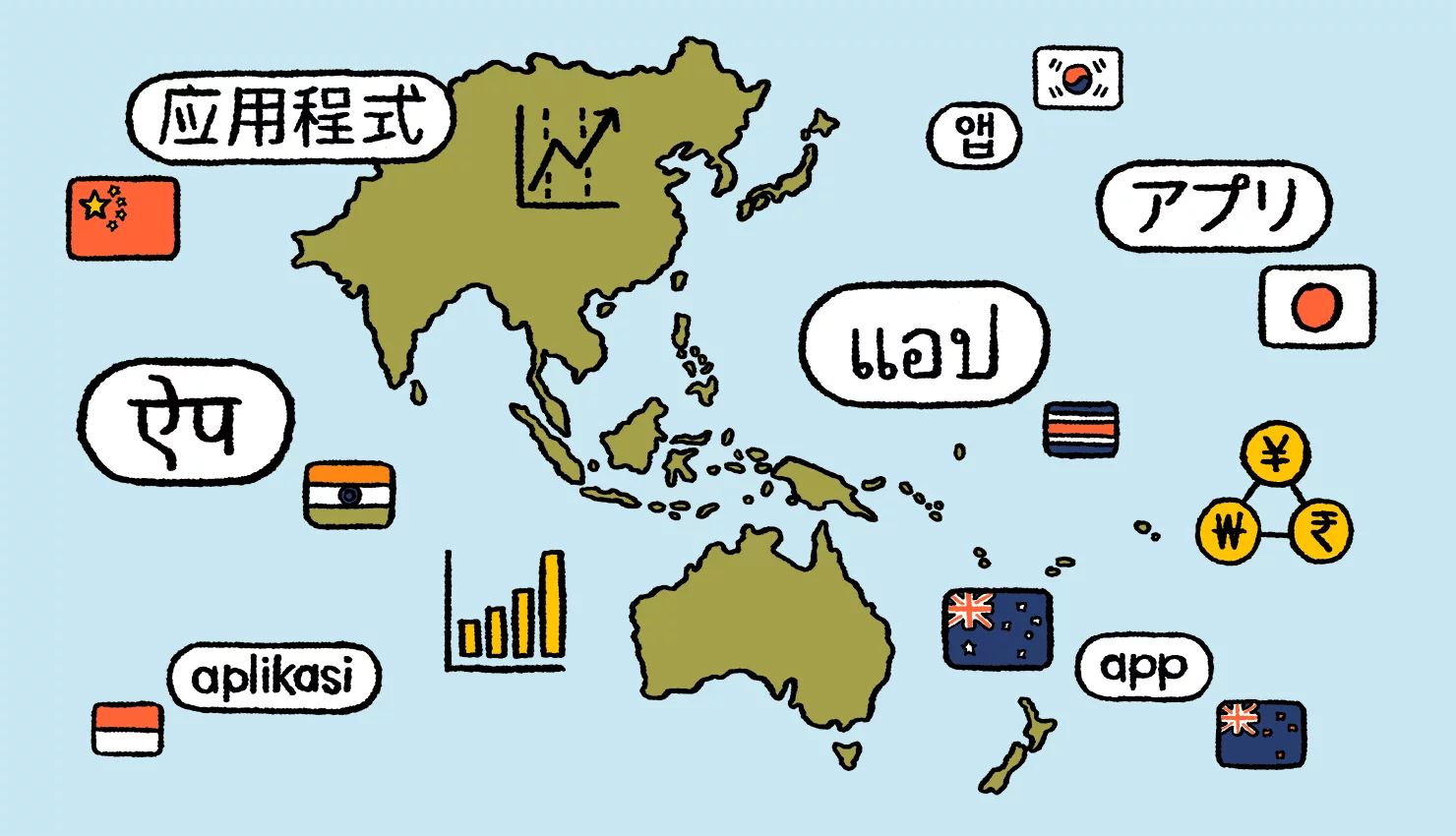
“The world is shifting to Asia”: discussing the APAC region with Yuka Nakasone
We have become used to thinking that the West dominates the global economy. It’s imprinted in our collective perception of the world. But the tides are turning. With the growing…
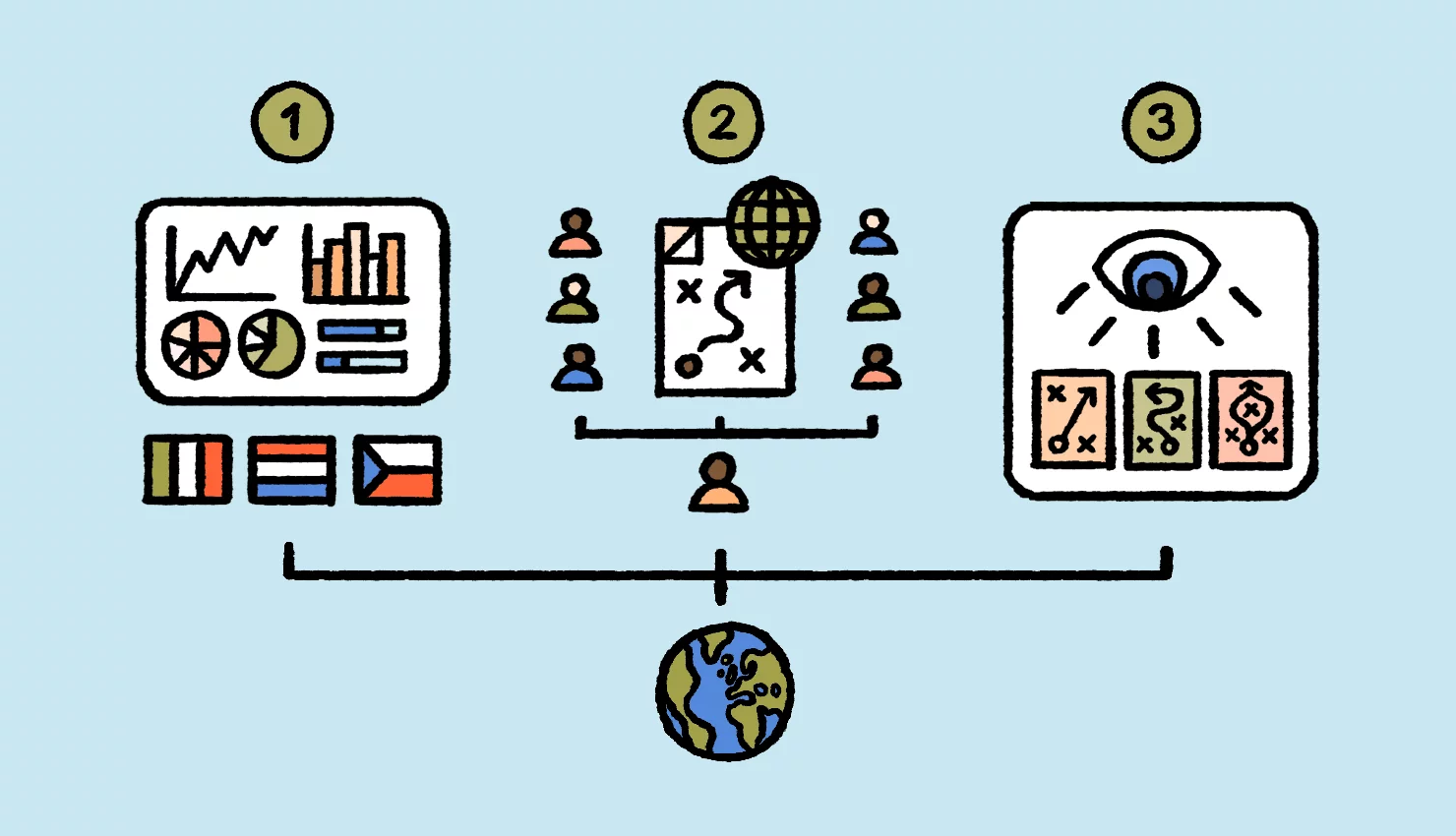
3 steps to building better market expansion strategies
Nowadays, companies can do international expansion faster than ever before. But many companies underestimate how hard it is to break into a new market. There’s quite a lot that goes…
Pros and Cons of Globalization
Trade has been the driving force of the global economy and interaction of communities since ancient times. With the technological advancement and evolution of society, international commerce is heightened. Currently, one can order goods from abroad and receive them anywhere around the world. The interconnectivity of the countries results from increased globalization, which raises controversy. Some view it as a setback, while others praise the phenomenon for reduced prices of commodities (World Economic Forum, 2019). Nonetheless, globalization has both benefits and downsides, with the advantages outweighing the disadvantages.
Globalization allows goods and services to be available to most people at low prices. The proponents of the concepts support it due to the affordability of commodities. Even people from impoverished nations have a chance to buy items. Additionally, international trade creates millions of jobs, which lift people out of poverty. Globalization allows businesses to invest in the capital-scare nation leading to the creation of employment for the locals (World Economic Forum, 2019). Typically, the developing countries that are rich with labor gain from the concept.
On the contrary, the freedom of conducting business across borders comes with myriad setbacks. For instance, in the developed nations such as America, the citizens experience competition for jobs, especially in the manufacturing industries. Citizens from developing countries offer cheap labor, and any business tends to choose less expensive services to maximize profits. Similarly, the developing nations experience stiff competition from developed countries that produce more affordable goods (World Economic Forum, 2019). Hence, most people tend to buy foreign items leading to losses for the domestic producers.
Overall, the advantages of globalization outweigh the disadvantages. Even though there is still a significant economic disparity among countries, the concept has enhanced the rapid developments of the impoverished nations by creating jobs and availing goods and services at affordable prices. For the few setbacks, it is upon the individual countries to enact domestic policies shielding their industries and workers from foreign competition.
World Economic Forum. (2019). An economist explains the pros and cons of globalization [Facebook video]. Web.
Cite this paper
- Chicago (N-B)
- Chicago (A-D)
StudyCorgi. (2023, February 17). Pros and Cons of Globalization. https://studycorgi.com/pros-and-cons-of-globalization/
"Pros and Cons of Globalization." StudyCorgi , 17 Feb. 2023, studycorgi.com/pros-and-cons-of-globalization/.
StudyCorgi . (2023) 'Pros and Cons of Globalization'. 17 February.
1. StudyCorgi . "Pros and Cons of Globalization." February 17, 2023. https://studycorgi.com/pros-and-cons-of-globalization/.
Bibliography
StudyCorgi . "Pros and Cons of Globalization." February 17, 2023. https://studycorgi.com/pros-and-cons-of-globalization/.
StudyCorgi . 2023. "Pros and Cons of Globalization." February 17, 2023. https://studycorgi.com/pros-and-cons-of-globalization/.
This paper, “Pros and Cons of Globalization”, was written and voluntary submitted to our free essay database by a straight-A student. Please ensure you properly reference the paper if you're using it to write your assignment.
Before publication, the StudyCorgi editorial team proofread and checked the paper to make sure it meets the highest standards in terms of grammar, punctuation, style, fact accuracy, copyright issues, and inclusive language. Last updated: February 17, 2023 .
If you are the author of this paper and no longer wish to have it published on StudyCorgi, request the removal . Please use the “ Donate your paper ” form to submit an essay.
- Search Search Please fill out this field.
What Is Globalization?
Understanding globalization, the history of globalization.
- Globalization FAQs
The Bottom Line
- Macroeconomics
Globalization in Business With History and Pros and Cons
:max_bytes(150000):strip_icc():format(webp)/jason_mugshot__jason_fernando-5bfc261946e0fb00260a1cea.jpg)
Globalization refers to the spread of the flow of financial products, goods, technology, information, and jobs across national borders and cultures. In economic terms, it describes an interdependence of nations around the globe fostered through free trade .
Key Takeaways
- Globalization is the spread of products, technology, information, and jobs across nations.
- Corporations in developed nations can gain a competitive edge through globalization.
- Developing countries also benefit through globalization as they tend to be more cost-effective and therefore attract jobs.
- The benefits of globalization have been questioned as the positive effects are not necessarily distributed equally.
- One clear result of globalization is that an economic downturn in one country can create a domino effect through its trade partners.
Alex Dos Diaz / Investopedia
Corporations gain a competitive advantage on multiple fronts through globalization. They can reduce operating costs by manufacturing abroad, buy raw materials more cheaply because of the reduction or removal of tariffs , and most of all, they gain access to millions of new consumers.
Globalization is a social, cultural, political, and legal phenomenon.
- Socially, it leads to greater interaction among various populations.
- Culturally, globalization represents the exchange of ideas, values, and artistic expression among cultures.
- Globalization also represents a trend toward the development of a single world culture.
- Politically, globalization has shifted attention to intergovernmental organizations like the United Nations (UN) and the World Trade Organization (WTO).
- Legally, globalization has altered how international law is created and enforced.
On one hand, globalization has created new jobs and economic growth through the cross-border flow of goods, capital, and labor. On the other hand, this growth and job creation are not distributed evenly across industries or countries.
Specific industries in certain countries, such as textile manufacturing in the U.S. or corn farming in Mexico, have suffered severe disruption or outright collapse as a result of increased international competition.
Globalization's motives are idealistic, as well as opportunistic, but the development of a global free market has benefited large corporations based in the Western world. Its impact remains mixed for workers, cultures, and small businesses around the globe, in both developed and emerging nations .
Globalization is not a new concept. Traders traveled vast distances in ancient times to buy commodities that were rare and expensive for sale in their homelands. The Industrial Revolution brought advances in transportation and communication in the 19th century that eased trade across borders.
The think tank Peterson Institute for International Economics (PIIE) states globalization stalled after World War I, and nations moved toward protectionism as they launched import taxes to more closely guard their industries in the aftermath of the conflict. This trend continued through the Great Depression and World War II until the U.S. took on an instrumental role in reviving international trade .
Globalization has sped up at an unprecedented pace, with public policy changes and communications technology innovations cited as the two main driving factors.
One of the critical steps in the path to globalization came with the North American Free Trade Agreement (NAFTA), signed in 1993. One of NAFTA's many effects was to give American auto manufacturers the incentive to relocate a portion of their manufacturing to Mexico where they could save on the costs of labor. NAFTA was replaced in 2020 by the United States-Mexico-Canada Agreement (USMC) .
Governments worldwide have integrated a free market economic system through fiscal policies and trade agreements in the 20th century. The core of most trade agreements is the removal or reduction of tariffs.
This evolution of economic systems has increased industrialization and financial opportunities in many nations. Governments now focus on removing barriers to trade and promoting international commerce.
Pros and Cons of Globalization
A larger market for goods and services
Cheaper consumer prices
Outsourcing can benefit both domestic firms and foreign labor
Increased standard of living
Concentrates wealth in richer countries
Some poorer countries can be left behind
Poorer countries can be exploited of their labor and physical & intellectual resources
Cultures and the products consumed around the world can become homogenized
Proponents of globalization believe it allows developing countries to catch up to industrialized nations through increased manufacturing, diversification, economic expansion, and improvements in standards of living .
Outsourcing by companies brings jobs and technology to developing countries, which helps them to grow their economies. Trade initiatives increase cross-border trading by removing supply-side and trade-related constraints.
Globalization has advanced social justice on an international scale as well, and advocates report that it has focused attention on human rights worldwide that might have otherwise been ignored on a large scale.
One clear result of globalization is that an economic downturn in one country can create a domino effect through its trade partners. For example, the 2008 financial crisis had a severe impact on Portugal, Ireland, Italy, Greece, and Spain. All these countries were members of the European Union , which had to step in to bail out debt-laden nations, which were thereafter known by the acronym PIIGS .
Globalization detractors argue that it has created a concentration of wealth and power in the hands of a small corporate elite that can gobble up smaller competitors around the globe.
Globalization has become a polarizing issue in the U.S. with the disappearance of entire industries to new locations abroad. It's seen as a major factor in the economic squeeze on the middle class .
For better and worse, globalization has also increased homogenization. Starbucks, Nike, and Gap dominate commercial space in many nations. The sheer size and reach of the U.S. have made the cultural exchange among nations largely a one-sided affair.
What Is Globalization and Why Is it Important?
In essence, globalization is about the world becoming increasingly interconnected . Countries today are more connected than ever before, due to factors such as air travel, containerized sea shipping, international trade agreements and legal treaties, and the Internet. In the world of business, globalization is associated with trends such as outsourcing, free trade, and international supply chains. Globalization is important as it increases the size of the global market, and allows more and different goods to be produced and sold for cheaper prices.
Globalization is also important because it is one of the most powerful forces affecting the modern world, so much so that it can be difficult to make sense of the world without understanding globalization. For example, many of the largest and most successful corporations in the world are in effect truly multinational organizations, with offices and supply chains stretched right across the world. These companies would not be able to exist if not for the complex network of trade routes, international legal agreements, and telecommunications infrastructure that were made possible through globalization. Important political developments, such as the ongoing trade conflict between the United States and China, are also directly related to globalization.
Is Globalization Good or Bad?
It depends. Proponents of globalization will point to the dramatic decline in poverty throughout the world for more than two decades after around year 2000, which many economists attribute in part to increased trade and investment between nations. Similarly, they will argue that globalization has allowed products and services such as cellphones, airplanes, and information technology to be spread far more widely throughout the world. On the other hand, critics of globalization will point to the negative impact it has had on specific nations’ industries, which might face increased competition from international firms. Globalization can also have negative environmental impacts due to economic development, industrialization, and international travel.
How Does Globalization Impact Society?
Globalization has had a large impact on societies around the world, leading to massive migrations from rural to industrial or urban areas, leading to the rapid growth of cities and trade hubs. While this has led to an overall increase in incomes and a higher standard of living in general, it has also led to problems of urbanization including crime, domestic violence, homelessness, and poverty. Concepts of national identity, culture, and consumption patterns also change as goods from around the world become increasingly available and at low prices. The competitiveness of global capitalism may also lead to more individualistic ideals that contradict the cultural orientations of certain, more collectivist societies.
What Is an Example of Globalization?
A simple example of globalization would be a car manufactured in the U.S. that sources parts from China, Japan, South Korea, Sri Lanka, and South Africa. The car is then exported to Europe, where it is sold to a driver who fills the car's gas tank with gasoline refined from Saudi oil.
Globalization refers to the ongoing trend of increased interconnectivity across the globe, as enabled by advancements in transportation and information technology, among others. Globalization is economically facilitated by free trade agreements, which permit barrier-free imports and exports across borders. While globalization brings many advantages—including lower prices and higher standards of living—it also has drawbacks, including wealth concentration and cultural homogenization.
Peterson Institute for International Economics. " What Is Globalization? "
Congressional Research Service. " The North American Free Trade Agreement ," Page 1.
Congressional Research Service. " The North American Free Trade Agreement ." Pages 16-17.
Office of the United States Trade Representative. " United States-Mexico-Canada Agreement ."
FasterCapital. “ Financial Bailout: PIIGS and Financial Bailouts: Lessons From the Crisis .”
Macrotrends. “ World Poverty Rate 1981-2024 .”
:max_bytes(150000):strip_icc():format(webp)/wall_street_179681980-5bfc2b9746e0fb0083c07d29.jpg)
- Terms of Service
- Editorial Policy
- Privacy Policy
- Your Privacy Choices
- WRITING CENTER
- CUSTOMER AREA
- Client Reviews
- Our Writers
- Sample Papers
- Study Resources
Get Your Grades Improved by Our Professional Writers - We are Trusted by Thousands of Students!
Global compose inc. constantly employs professional homework writing help writers from usa, uk, ca and au. the writers are highly trained professionals, comprising of 500+ masters and ph.d level writers available 24/7. we assist clients who either have difficulty completing their assignments, sick or in need family time. to get started, submit your instructions., calculate your order price.
Use Discount Code: FIRST5 at Checkout FIRST5 -->
PRICE BEFORE DISCOUNT: $15.00
- Social Work and Human Services
Sample Essay on Pros and Cons of Globalization
Get homework help on this topic - check the quality of writing from this sample, if you are looking for assignment help on this topic or similar topic, click on order now button to submit your details. once we have your order details, your assignment will be assigned to one of our best writers, who will then proceed to write your paper and deliver it within your specified deadline. thank you for choosing us today.
Globalization is the spread of technologies, businesses, philosophies, and other ideals across the world that is brought by integration among people. Globalization has created a technological revolution and expanded rules for the organization of modern capitalist economies and markets in the whole world. Globalization has its pros, but we also have drawbacks such as the vanishing of ethnic identity and the spread of imperialism. The pros of globalization include the increased international flow of trade, capital, information, and people, increased external finance, improved technology, and political conformism. It is through globalization that societies are integrated together into a globalized collection of economic and political ideas. However, globalization has its cons which include loss of cultural identity, westernization, the death of small businesses among others. This essay analyzes globalization by looking at its pros and cons.
Businesses are now only a mouse-click away from their customers and competitors across the globe. Globalization is aiding poor countries to catch up with rich countries that have many industries through increased technological advancement. Globalization contributes to the progress of the world because it promotes trade and distribution of knowledge
Globalization results in easy access to products that are needed by consumers because of modern technology. Increased access to products as a result of globalization has reduced prices of goods due to competition and increased food supply. Free trade is a result of globalization; free trade also allows nations and economies to specialize thus producing higher-quality goods at better prices. Manufacturers in nations that have free trade agreements benefit in the form of a larger export market. The consumer enjoys a greater choice of goods and services as a result of globalization since foreign firms easily offer their products for sale.
Labor, Globalization enables large firms to access labor because foreign companies are moving towards the developing countries to acquire the labor force. International firms hire workers from other countries to work for them by using online telecommunications. This caters to employment and income generation to the people in the host country because of the good jobs that foreign companies bring.
The competition that is brought by globalization makes companies offer a more competing value for the products that they sell to consumers. This is because the pressure that results from the competition makes firms identify more efficient ways of making use of the existing resources. The fact that companies are not limited by geographical boundaries increases competition and makes each firm to produce the best as compared to when companies enjoy the monopoly. As a result, of competition, companies face the pressure of developing innovative ways so as to stay ahead of competitors. Globalization also benefits multinational corporations, because these organizations seek to maximize the opportunities offered by the existence of certain factors of production which can be advantageously exploited in different countries. Due to their potential, they have a high degree of flexibility, which allows easy modification or change of strategies as they move from one place to another.
Liberty, globalization has a positive effect on liberty because high globalized countries have relatively more civil liberties, political rights, and economic freedom than low globalized countries. Economic integration as a result of globalization has a correlation with political and civil rights as various studies have shown. Globalization stimulates political reforms by increasing freedom of people in exercising greater control over their lives. Multinational firms have good incentives to offer competitive benefits and wages than local firms in developing countries. The Economic freedom which is brought by globalization help to nurture educate people of their rights and freedom and thus making them not to be vulnerable to dictatorial regimes. People who are economically free over time want and expect to exercise their political and civil rights and thus promote liberty in developing counties. A government that seals its citizens off from the rest of the world easily controls them and deprives them of liberty and freedom. Governments that grant its citizens freedom to take part in international commerce get it hard to deprive them of their rights, for instance, political and civil liberties. Globalization is also crucial in spreading democratic values to developed countries and independence to developing states.
Globalization creates inequality the widening gap between the haves and the have-nots in many countries is as a result of globalization. Inequality, many countries in the world, has crept upwards as a result of globalization (Bourguignon 11) . Companies in developed countries are being moved to foreign countries where labor is cheaply available as a result of globalization. The country in which international firms are established generates less revenue, and a large share of the profits goes to the foreign firm. Companies from foreign nations make large profits thus creating a huge income gap between the developed and the host country. Liberalization which is a result of globalization has contributed to increasing inequality in the developed world. The increase in the international mobility of firms, wealth, and workers over the past years has made it harder for governments to combat inequality, for instance, wealthy individuals have become increasingly able to shift capital to countries with low tax rates thus allowing them to avoid paying more redistributive taxes in their home countries.
Second, globalization also leads to imperialism whereby the values of more powerful states take precedence in the global market. Globalization has made it easier for influential countries to advance their ideologies and agenda to developing states which are mostly dictated by developed countries. Globalization is westernization, in as much as westernization symbolizes the good and the bad not only for Western culture but also of the liberal philosophy. The integration that is going on in the world as a result of technological changes is favorable to the values and civilization of Western states. Westernization eroded the cultures of poor nations and has promoted the spread of imperialist ideals of powerful states.
Neoliberalism, globalization also introduces a global economy that is uniform as a result of the process of deregulation and liberalization because as many nations are open to the free market. It has made liberal democracy the only viable option for many countries in the world because those are the ideals that have been spread by powerful nations. Liberal democracy has become the standard for assessing the worth and competence of all societies because powerful nations see it as the best. Moral ideas that are spread because of liberalism, for instance, the defense for human rights, liberal democracy have spread in many societies and thus making neo-liberalism take precedence.
Human and ethical concerns, globalization, has compromised the ability of future generations because of the impacts it has on the environment. Generations that will come in the future may not be able to meet their needs and desires due to the continued degradation of the environment by globalization. The moral basis of ecological sustainability is the ethical position that destroying the earth through pollution is wrong. Environmental issues, for instance, global warming, and deforestation, degradation of ocean habitats, and depletion of the ozone layer have been brought about by globalization. Environmental pollution is a human concern that has been exacerbated by industrialization which has resulted from globalization. The increasing interaction between countries has led to an increase in transportation progress at all geographical levels. This has caused a wide variety of threats to the environment, for example, depletion of natural resources which are on the verge of extinction. Deforestation has created an imbalance in the environment leading to climate change and the occurrence of calamities, for instance, floods.
Labor drain, globalization also drains some countries of labor due to the movement of people looking for good jobs across borders. Movement of workers across borders leads to brain drain whereby poor countries are deprived of labor by rich countries due to the lucrative jobs that they have for skilled laborers. The movement of people across borders in search of jobs has led to the weakening of cultures for greater cultural hegemony.
Economic activities are becoming organized on a global scale giving a new international division of labor, with production, investment patterns and movements, and technology transfers as a result of globalization. However, globalization has also brought with it negative consequences such as environmental degradation, the death of small and medium businesses, loss of cultural identity, and the effect of foreign policies on domestic economic development. Globalization has pros and cons, but one certainty is that it still exists and remains a pertinent issue that has raised the eyebrow of many scholars and policymakers across the world.
Works cited
Bourguignon f. inequality and globalization. foreign affairs [serial online]. january 2016; 95(1):11-15. available from: business source complete, ipswich, ma. accessed february 24, 2016., do you have an assignment on a similar or related topic we can help you right now click on the order now button....
Are you looking for homework writing help on this topic? This question was posted by one of our client seeking homework help. If you are therefore looking for an assignment to submit, then click on ORDER NOW button or contact us today. Our Professional Writers will be glad to write your paper from scratch, and delivered within your deadline. Perfect choice for your excellent grades! www.globalcompose.com.
We ensure that assignment instructions are followed, the paper is written from scratch. If you are not satisfied by our service, you can either request for refund or unlimited revisions for your order at absolutely no extra pay. Once the writer has completed your paper, the editors check your paper for any grammar/formatting/plagiarism mistakes, then the final paper is sent to your email.
Writing Features
Affordable Writing Services
Experienced Writing Team
24/7 Team of Writers
Professional E ssay Writers
Quality Measures
Trained Support Team
Non-Plagiarized Papers
Well Researched Papers
Free Writing Resources
Privacy | Confidentiality
We do not share your personal information with any company or person. we have also ensured that the ordering process is secure; you can check the security feature in the browser. for confidentiality purposes, all papers are sent to your personal email. if you have any questions, contact us any time via email, live chat or our phone number., our clients testimonials, a team of +500 masters and ph.d level homework writing help writers available 24/7 cannot get it wrong. the following are customer reviews about the quality of our services..
“Thanks for offering your professional assistance on this one. Topic was confusing but writer worked it out”
Added 24 Minutes Ago
“Thanks, I like the literature review, it is discussed in depth. Have looked at the results section and it is conclusive as I expected. Thank you”
Added 12 Hours Ago
“I like the discussion on the case study. Thank you. Am satisfied and wanted to request that same writer will handle my future assignments”
Added 30 Minutes Ago
“I was paranoid about online writing services, but on this one, the results are evident that you are much better. Will order more papers”
Added 3 Minutes Ago
“I think the paper is alright. If I can book the writer for the soon upcoming assignment, it will be great. Thanks”
Added 6 Minutes Ago
Why choose our homework writing help, we try to work as diligent as we can to help you meet your homework’s deadline. our support staff is always online 24/7 to help clarify any issues or concerns you have regarding our services. talk to us today to find out how our writers may be of help to you., customized papers, we consider your instructions and specifications in order to tailor the paper to suit your expectations., only professional writers, all our writers have a masters or ph.d and are well trained to handle assignments in various disciplines at different education levels., fast and reliable, our writers are capable of handling any assignment with short deadline and deliver without any delay, thus saving you time and energy, round the clock support, our customer support is always ready to offer real time assistance of day and night, through email, live-chat and phone., cost effective prices, we save you money with our affordable prices and huge discounts on all assignments., 100% original papers, all our papers are thoroughly researched and written from scratch. be sure of completely non-plagiarized papers., our ordering process, to get started with our homework writing help, simply click on the order now button. its easy, secure and takes less than 2 minutes to complete. the following steps illustrates the entire process., fill the order form: include all instructions and files for your assignment., submit your payment via card or paypal so that your order can be processed., a writer works on your paper and submits to editors upon completion., the completed paper is examined by our editors, then sent to your email, want to learn from experts check the writing tips below.
Final Paper Assignments
- Thesis Writing Help
- Dissertation Chapters
- Writing Research Papers
- Project Writing
- Term Paper Writing
- Speech Writing
Weekly Assignments
- Essay Writing
- Coursework Writing
- Assignment Writing Help
- Homework Writing Help
- Book Review Writing
- Movie Review Writing
Creative Assignments
- Power Points Preparation
- Analyzing Case Studies
- Creative Writing Papers
- Critical Thinking Writing
- Annotated Bibliography
- Capstone Project Writing
Admission Papers
- Writing Scholarship Essay
- Writing Admission Essays
- Writing Application Essays
- Writing Entrance Essays
- Personal Statement Essays
- Reaction Paper Writing
Samples of our Writing Illustrated Below
We have compiled a list of samples written by our writers for your review. you can use these samples to write your paper. you must however cite the source properly. if you are looking for a non-plagiarised paper, click on the order button. our professionals will work on your order. are you looking for writing tips check the list on this page. we are glad that we could help..
- Discussion Essay Homework
- Dissertation/Thesis Writing
- Book Review Paper
- Business Plan Homework
- Capstone Project Paper
- Creative Writing Homework
- Critical Thinking Homework
- Application Essay Homework
- Case Study Homework
- Literature Review Homework
- Personal Reflection Homework
- Reflection Essay Homework
- Research Proposal Homework
- Annotated bibliography Paper
- Article Review Homework
- Research Paper Homework
- Movie Review Sample
- Term Paper Sample
- Admission Essay Homework
- Argumentative Essay Paper
- Response Essay Homework
A List of Related Papers On This Category is Provided Below
- Sample Paper on Family Care Giving Reflections
- Sample Term Paper on Social Problem
- Sample Critical Thinking Paper on Perceived Preparedness and Knowledge for Substance Addiction
- Sample Article Review Paper Attribution Theory
- Sample Coursework Paper on Multicultural Influences of Staten Island, NY
- Sample Essay on Ecological Analysis of an Adult
- Sample Essay on Population Perspectives on Policy
- Sample Research Proposal Paper on Parental Employment Status
- Sample Essay Paper on Resource Guide
- Sample Research Paper on the Effects of Anger and Gender Roles as They Relate to Domestic Violence
- Sample Critical Thinking Paper on Policy Analysis on Law that Affects the Elderly
- Sample Coursework Paper on Artifact Analysis
- Sample Essay on the Impact of Social Policy
- Sample Coursework Paper on Conducting Qualitative Research
- Sample Research Paper on Social Work and Human Services
- Sample Research Paper on Ill Health as a Related Social Issue to Poverty in USA
- Sample Assignment Paper on Week 4 – Application of Research – Voice Thread Peer Response Video
- Sample Essay on Improving User Privacy in Facebook and other Social Media
Get your Homework Written by our Top-Notch Writers Now
Pros and Cons of Globalization – CSS Essay
Note: The topic “Pros and Cons of Globalization” came in the CSS Essay Paper – 2021. The admin attempted the following essay and cleared this exam.
Please be clear that we have broken the paragraphs for clarity. However, this is not recommended in essay writing. You have to follow the proper structure of essay writing .
Globalization is defined as the free flow and movement of people, ideas, information, and goods across borders.
It was in the second half of the twentieth century that the world witnessed a conspicuous shift from Nationalism and Mercantilism to Globalization and International Liberal Economic Order.
The main motive behind free trade and globalization was mutual interests and gains. Countries opened up their borders. Ultimately, it marked the beginning of a new era defined by the free movement of goods and people across the border.
Primarily, it was the end of World War II that marked the setting up of global institutions like the United Nations, the International Court of Justice, the World Trade Organization (erstwhile General Agreement on Tariffs and Trade), etc.
It was believed that these institutions will help in maintaining peace in the world and avoid another major global war or conflict.
In short, from the latter half of the 20 th century till the present, the world remained largely globalized.
Since we have witnessed the entire period of globalization, we can fairly analyze the pros and cons of globalization from hindsight.
So, is globalization good? Does it provide a win-win situation for every country? Are there some drawbacks or cons of globalization too? Let’s dig into details to find answers.
5 Major Pros of Globalization
Globalization offers multiple advantages acknowledged by everyone and denied by none. Following are a few major pros of globalization.
1. Globalization offers Mutual Cooperation & Development
In the past, when the world was non-globalized and nationalism was prevailing, there was a lack of cooperation between states. Even, countries were suspicious of each other. The focus was on self-development and progress. States never cooperated with each other for mutual progress and development.
With the advent of globalization, today’s states are cooperating with each other in the field of education, science, and technology. Moreover, states are working on the basis of mutual intelligence sharing for enhanced security.
For instance, in the recent pandemic crisis, how China has sent medical supplies and teams across borders and oceans clearly highlights the essence of globalization. Those states that were missing ventilators, vaccines, etc got help from other states in fighting Covid-19.
This is an example from recent times. For other example, the spread of Information and Communication Technology across the world is also a hallmark of globalization.
There are multiple regional-level and global-level organizations active today. For example, SAARC, ASEAN, SCO, UNO, WTO, etc all work for the mutual interests of the member countries.
Hence, mutual cooperation and the development of countries are among the most prominent advantages of globalization.
2. Globalization offers more Peace in the World
It is no denying the fact that globalization has brought peace to the world. Though we do witness wars and conflicts even today, those are not on such large scales as in the pre-globalized world.
The pre-globalized world had witnessed two great wars in the 20 th century and many even before that. While the states were not interconnected, they remained suspicious of each other’s strengths, motives, and activities. They lacked mutual interests and goals.
Today, the role played by global institutions in the maintenance of world peace is commendable.
Moreover, in today’s globalized world, states are working on common interests and are dependent on each other. With mutual dependency, they are pursuing common economic interests in the form of trade. With each other’s help, states are advancing in science and technology.
Such interdependency has altogether dismissed the chances of any major global conflict in the future.
Moreover, globalization has enhanced people-to-people contact. When people from different cultural backgrounds meet each other and learn about other cultures, it creates a feeling of harmony and goodwill among them. This ultimately promotes peace among nations.
3. More Employment Opportunities for Individuals in a Globalized World
In today’s globalized world, there are multiple employment opportunities for individuals. To explain this fact, we see that multiple multinational companies are working with their branches installed across borders. These companies employ manpower from third-world countries. Thus, those who couldn’t find jobs in local companies or in other public sectors get better employment opportunities.
Moreover, today people also find opportunities to find lucrative jobs across borders. For instance, the report says that 2.7 million Pakistani expatriates are living in Saudi Arabia and working there. It is entirely due to the globalized world that these Pakistani got a chance to better living.
Moreover, educated people also find better opportunities for better employment across borders.
Thus, with enhanced employment opportunities, globalization can actually lift people out of poverty.
4. Market Competition keeps the Prices Down
Another major benefit of globalization and free trade is that the prices of commodities remain down.
As globalization has eradicated monopolies with multiple multinational companies competing for markets, these companies try to keep their product prices down to beat the competitors.
Ultimately, it benefits the locals residing in the country who can access the goods at a lower and justified price.
5. Better Educational Opportunities for Students
In today’s globalized world, where people can freely move across borders, students get better educational opportunities.
Today, one can search and apply for any foreign university via the internet.
Moreover, the internet and information technology have also introduced (esp. during Covid-19 times) E-learning and online classes.
So, students do not actually have to move abroad but attend classes from the comforts of home.
4 Prominent Cons of Globalization
As we have discussed some prominent pros of globalization, let us also highlight some major cons of globalization.
1. Exploitation of Poor States by the Rich States
One major argument that goes against globalization is the exploitation of poor states or the global South by rich states or the global North.
This exploitation occurs in the following many ways.
Globalization is said to be a new version of colonialism. During colonialism , rich states exploited poor states by taking their raw materials and dumping finished goods in their markets for financial gains.
This is equally true for globalization. Big multinational companies hire skilled labor from poor countries by paying them better. This results in the closure of local companies in poor states as they cannot hire the same skilled labor for the same wages.
Moreover, small companies in some poor countries cannot compete with bigger multinational companies in global markets.
We can say that globalization further fosters unequal relations between countries or companies.
Furthermore, when big companies install their set-up in third-world countries, apart from exploiting its resources and manpower, it also spoils the atmosphere of that country with the emission of carbon.
In short, globalization has resulted in the exploitation of the poor by the rich in multiple ways.
2. Globalized world poses threats to Cultures | Cultural Assimilation
As with globalization comes great intermingling of people through the cross-border movement of people.
Through this process, different cultures come in close contact. This often results in cultural assimilation where people of one culture tend to adopt the norms and values of the other major culture.
Thus, it poses a great threat to the smaller culture as it might wither away for good.
For instance, if we take the example of Pakistan, the people of Pakistan are adopting western culture, learning their (English) language, adopting their lifestyle, dressing like them, and largely becoming oblivion to their own unique cultural norms and values . This is happening because of globalization.
3. Emerging Non-Traditional Security Threats
This can be best understood from the recent Covid-19 pandemic spread across the world. Ironically, it was China who sneezed first and the rest of the world caught a cold.
Today’s globalized world is more prone to be affected by any pandemic or viral disease within a few days. With the free flow of people and goods across the open borders can travel any sort of virus freely.
For instance, the spread of the Swine Flu, Ebola Virus, and Covid-19, to name a few, was the result of well-interconnectivity in the world.
Similarly, there is also a threat to the economy due to the interconnected world.
As we have seen in 2008, how the impacts of the Great Recession in the United States were felt all over the world. Thus, an economic disturbance in one state causes a disturbance in the whole world’s economy today.
4. Growing Terrorism
Globalization also offers terrorists a healthy atmosphere to spread and grow. Today, terrorist networks are fast spreading and growing.
With open borders and free movement, these terrorists can move anywhere with ease.
It was only possible because of globalization that terrorists planned and attacked the twin towers of the USA in 2001 from Afghanistan (as it is believed).
Moreover, the spread of ISIS, the Taliban, and various other terrorist organizations is also a fallout of globalization. These terrorist outfits are recruiting people from across the world with great ease in today’s globalized and connected world.
Wrapping Up
Although there are multiple pros and cons of globalization and some of them have been discussed in this write-up, overall the pros of globalization outweigh the cons.
Today, we cannot even think of going back to the pre-globalized world ridden with conflicts and lack of development.
However, today, world communities together with mutual cooperation can work on eliminating the drawbacks of globalization.
We can only hope for a better future for the world through mutual cooperation of states and the strengthening of globalization.
You may also like

Is Technology Making Us Less Human?

Essay on Islamophobia for CSS Exam

International Relations (IR) MCQs from CSS Past Papers...
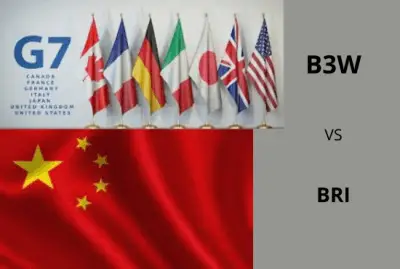
B3W vs BRI | A Detailed Comparative Analysis

Friendship Essay in English for Students | 700 Words

Child Labour Essay | 1400 Words
About the author.
A versatile human being with a passion for reading and writing - always striving for growth, living in the moment but trying to keep pace with the evolving world.
[…] The topic has been taken from CSS Essay Paper – 2020 ALSO READ: Pros & Cons of Globalization Spread the […]
[…] Pros and Cons of Globalization […]
Leave a Comment X
Save my name, email, and website in this browser for the next time I comment.
- Bahasa Indonesia
- Español (España)
- Español (América Latina)
- Francais (Canada)
- View by list
- View by logo
AGM Factory
Alchemy Software Development
Astoria Software
Digital Reef
Lassostudios
LMK Clinical Research
Lylo Media Group
Propulse Video
Scheune München
Skilltelligence
Sterling Technology
Sublime Subtitling & Translation
TransPerfect Legal
Translations.com
TransPerfect Connect
TransPerfect Digital
TransPerfect Medical Device Solutions
Trial Interactive
Subtitling vs. Dubbing: Navigating the Pros and Cons in Media Localization

In today’s world, we are more globally interconnected than ever before. The demand for international content has skyrocketed, prompting the need for effective media localization. Among the key considerations in this process are the methods of translation, or how your audience will digest your media content, and whether subtitling, dubbing, or both are necessary. Both techniques aim to break language barriers, but each comes with its own set of pros and cons. Let’s explore the intricacies of subtitling and dubbing, delving into the advantages and disadvantages of each to help you make an informed decision for your media localization strategy.
Subtitling: Pros and Cons
1. Preservation of Original Voice and Intention:
Subtitling maintains the authenticity of the original audio by preserving the original voices of the actors. This helps in conveying the nuances of emotions, tone, and cultural aspects as intended by the filmmakers or content creators.
2. Cost-Effectiveness:
Subtitling is generally more budget-friendly compared to dubbing as the process just involves translating the script and syncing it with the original audio. At times, transcreation is needed (adapting vocabulary to a specific region or country), but with subtitles, adaptations can be swapped faster than dubbing, which requires re-recording voices.
3. Accessibility:
Subtitles can allow viewers from around the world to experience a piece of content through translated text. They can also be formatted to provide descriptions of other sounds in addition to translated dialog for the deaf and hard of hearing.
1. Multitasking for Viewers:
Subtitles require viewers to read while watching, which can be challenging for some audiences and certain types of content. This can result in missed visual elements or nuances in the performances as viewers split their attention between reading and watching.
2. Barriers to Understanding
While subtitles break the language barrier to a certain extent, they may still pose a challenge for those who struggle with reading or have visual impairments, limiting accessibility for a broader audience. There are specific types of subtitles or captions that can help enhance accessibility for viewers.
3. Space Constraints:
Subtitles often have limited space on the screen, making it challenging to convey longer sentences or complex dialogue effectively. This can lead to condensed translations that may not fully capture the original meaning.
Dubbing: Pros and Cons
1. Seamless Viewing Experience:
Dubbing provides a seamless viewing experience as viewers can focus solely on the visuals without the distraction of reading subtitles. This is especially beneficial for action-packed scenes where reading may cause a disconnect.
2. Enhanced Accessibility:
Dubbing caters to a broader audience, including those who may struggle with reading or have visual impairments. Delivering content in a viewer's spoken native language eliminates barriers to understanding more effectively.
3. Cultural Adaptation and Tone:
Dubbing allows for cultural adaptation by incorporating regional accents, colloquialisms, and references, enhancing the relatability of the content for diverse audiences around the world.
1. Loss of Original Voice:
Dubbing involves replacing the original voices with those of local actors. This can lead to a loss of the original voice performances and, at times, alter the emotional impact intended by the filmmakers. For example, a large portion of Tom Cruise’s films have had the same voice actors since the eighties to keep consistency, but not all talents may be available for each project.
2. Synchronization Challenges:
Achieving perfect synchronization between the dubbed voices and the lip movements of the actors can be a complex task. Poor synchronization and bad translation can result in a disjointed viewing experience, as we’ve seen with popular foreign series in the past few years.
3. Higher Production Costs:
Depending on the technology available, dubbing can require additional resources, such as hiring voice actors, sound engineers, and translators. Technology such as cloud-based recording management tools can help reduce the overall cost significantly but still outweighs the cost of subtitling.
In the ongoing debate between subtitling and dubbing, there is no one-size-fits-all solution. The choice between the two depends on various factors, including the target audience, budget constraints, and the desired level of authenticity. Subtitling maintains the original voice and intention but may pose challenges for some viewers, while dubbing offers a seamless experience at a higher cost and the potential loss of the original voice performances.
Ultimately, the key is to strike a balance that aligns with the goals of media localization and the preferences of the target audience. As the global appetite for diverse content continues to grow, the evolution of subtitling and dubbing techniques will likely play a crucial role in bridging linguistic gaps and fostering cross-cultural understanding in the realm of entertainment.
TransPerfect Media’s teams are experts in advising per project on which tools are best for your content, the target audience, and cultural and technological factors. Learn more about our range of services and technologies to provide your next project with the global presence it deserves—with expert quality and competitive pricing. Learn more by emailing [email protected] or visiting www.transperfect.com/media .

Stanley vs. Yeti: Which is Better?
Here's what we think after using the Stanley cup and Yeti tumbler for over a year.

We've been independently researching and testing products for over 120 years. If you buy through our links, we may earn a commission. Learn more about our review process.
How we test Stanley and Yeti
In the Good Housekeeping Institute Kitchen Appliances and Innovation Lab, we test all types of products related to eating and drinking, including the best water bottles , the best insulated water bottles , the best Stanley cup dupes and more. We've been using the popular 40-ounce Stanley cup for more than a year now and continue to switch between the original and the newer model, known as the The Quencher H2.0 Flowstate Tumbler, which won one of our Kitchen Gear Awards for its innovation and high consumer survey results.
We've also been using the Yeti tumbler a.k.a. the Yeti Rambler 35-ounce Straw Mug, which is highly comparable to the Stanley cup, for about a year.
When we test Stanley cups and water bottles in the Lab, we evaluate how well they retain temperature over 24 hours, how leak-proof they are, how durable they are, how easy they are to use and drink from and how easy they are to clean. We also send a handful home with consumer testers to see how they hold up in real life. Here's how the Stanley cup and Yeti tumbler compare:
The Stanley cup
Stanley quencher h2.0 flowstate insulated tumbler, 40 oz.

The Stanley cup has a tall, slim profile with a tapered base that easily fits into most cupholders. The oversized plastic handle allows you to pass your hand through and get a good, comfortable grip on the cup itself, which feels nice and balanced in the hand. It also has an opaque plastic lid that you can drink out of like a cup or use with the provided straw.
The H2.0 version, which is the version sold now, has a silicone gasket built into the removable inner piece on the lid that help prevents splashing and big leaks; note that it still leaks when knocked on its side and should be held upright. The lid screws on and off the cup easily. All parts are dishwasher safe — just make sure to take apart all of the lid's pieces to get a good clean because mold can develop on the silicone if not cleaned and dried properly.
The 40-ounce size is the one we use, but it also comes in a comparable 30-ounce. You can get a larger 64-ounce size too, but it doesn't have a tapered base and looks more like a jug. The 20-ounce and 14-ounce sizes look similar to the 40-ounce, but they don't have a handle.
The Yeti tumbler
Yeti rambler 35 oz straw mug.

The Yeti Rambler tumbler with built-in handle comes in three sizes that all look quite similar: 25 ounces, 35 ounces and 42 ounces. They each have tapered bases that fit in traditional cupholders. The 35-ounce version is the one we reach for most often. It feels heavy and durable with a smaller, harder handle than the Stanley.
The Yeti handle feels like it's designed to be held onto versus sliding your hand through and hugging the mug; it's a little small and felt snug around our hands. The tumbler has a clear lid that seals on by pushing on it. It offers one way to drink unless you buy a corresponding MagSlider Lid , which screws onto the cup and helps prevent leaking when closed properly. (In our Lab tests, the lid with straw leaked a little when knocked over, but stopped after 20 seconds.) Yeti also makes a 20-ounce and 30-ounce tumbler that features their Stronghold Lid that screws onto the tumblers for a more secure fit that does still leak a little when turned upside down.
The Yeti tumbler, like the brand's popular Rambler water bottles, have an uncoated stainless steel base and rim that we found helps with the cup's durability and longevity: We've run them through the dishwasher endless times and haven't experienced any chipping of the cup's colored areas like we have on other cups that are completely coated. (The Stanley cup's rim is uncoated but its base is coated. The base has slightly scratched over time.)
Stanley vs. Yeti
When directly compared, the 40-ounce Stanley cup feels lighter and slimmer than the all of the Yeti tumblers with a built-in handle. We think its lid is easier to put on and take off than the Yeti, but more involved to clean. We prefer the larger, softer Stanley cup handle, but can understand how the Yeti's handle can be appealing to people who like holding their cups by the handle versus wrapping their hand around the cup.
When we tested Stanley water bottles and Yeti water bottles side by side, they both offered the similar temperature retention over 24 hours — the Stanley kept water cooler by only one degree than the Yeti.
They're also comparable in terms of price — the 40-ounce Stanley cup costs $40 while the $42-ounce Yeti tumbler costs $45 and the 35-ounce costs $42.
Is Stanley or Yeti better?
It's hard to suggest that Stanley or Yeti is better than the other. Both brands make highly durable and well-designed products that last a long time and performed well in our Lab tests.
The main difference between the two come down to design: Stanley tends to make tumblers and water bottles in more color options and styles than Yeti but both offer a wide variety to choose from.
Why trust Good Housekeeping?
Nicole Papantoniou is the director of the Good Housekeeping Institute's Kitchen Appliances and Innovation Lab, where she oversees all testing and content related to kitchen tools, gadgets and appliances. She's an avid Stanley cup and Stanley cup dupe user and has used both the Stanley cup and Yeti tumbler extensively.
Nicole (she/her) is the director of the Good Housekeeping Institute 's Kitchen Appliances and Innovation Lab, where she has overseen content and testing related to kitchen and cooking appliances, tools and gear since 2019. She’s an experienced product tester and recipe creator, trained in classic culinary arts and culinary nutrition. She has worked in test kitchens for small kitchen appliance brands and national magazines, including Family Circle and Ladies’ Home Journal .
@media(max-width: 64rem){.css-o9j0dn:before{margin-bottom:0.5rem;margin-right:0.625rem;color:#ffffff;width:1.25rem;bottom:-0.2rem;height:1.25rem;content:'_';display:inline-block;position:relative;line-height:1;background-repeat:no-repeat;}.loaded .css-o9j0dn:before{background-image:url(/_assets/design-tokens/goodhousekeeping/static/images/Clover.5c7a1a0.svg);}}@media(min-width: 48rem){.loaded .css-o9j0dn:before{background-image:url(/_assets/design-tokens/goodhousekeeping/static/images/Clover.5c7a1a0.svg);}} Home Products

The Best Smart Bird Feeders

Spring Cleaning Shortcuts From a Cleaning Expert

Quiz: Find Your Family’s Next Era

Best Electric Lawn Mowers

The Best L-Shaped Sofas

The Best Above-Ground Pools

The Best Picnic Blankets

Everything Our Home Editor Is Coveting This Month

The Best Beach Towels on Amazon

The Best Percale Sheets

The Best Beach Towels

IMAGES
VIDEO
COMMENTS
1. Increased Economic Growth. Globalization facilitates technology, knowledge, and goods transfer, which in turn boosts economic growth (Erixon, 2018). Through globalization, countries can now purchase the newest technologies and import the most productive machinery from other countries. This means every country now has access to the most ...
When discussing the drawbacks and benefits of globalization, essays tend to be on the longer side. The example below is a brief exploration of this complex subject. ... Learn more in this concise globalization pros and cons essay. We will write a custom essay on your topic a custom Essay on Advantages and Disadvantages of Globalization Essay ...
globalization, integration of the world's economies, politics, and cultures.German-born American economist Theodore Levitt has been credited with having coined the term globalization in a 1983 article titled "The Globalization of Markets." The phenomenon is widely considered to have begun in the 19th century following the advent of the Industrial Revolution, but some scholars date it ...
First, the previous waves of globalization have been quite successful in lifting a large number of people out of poverty and so we should appreciate that. The second thing is that any form of globalization will generate winners and losers. So even if you have the perfect, most optimal international trade agreements, there will always be those ...
Cons of globalization include: Unequal economic growth. While globalization tends to increase economic growth for many countries, the growth isn't equal—richer countries often benefit more than developing countries. Lack of local businesses. The policies permitting globalization tend to advantage companies that have the resources and ...
3. Increased Cross-Border Investment. According to the course Global Business, globalization has led to an increase in cross-border investment. At the macroeconomic level, this international investment has been shown to enhance welfare on both sides of the equation.
While globalization has brought numerous benefits such as economic growth, technological advancements, and cultural exchange, it has also presented challenges including inequality, cultural homogenization, and environmental concerns. This essay will explore these pros and cons, shedding light on the complexities of globalization.
Web. 28 May 2015. Pro-Globalization Article 4: "The globalization of football: a study in the glocalization of the 'serious life'". Richard Giulianotti and Roland Robertson provide interesting and unique insights about how globalization, particularly in sports, can promote a greater "global democracy.".
The pros and cons of globalization. This kind of intense globalization brings together people from around the world. But—and there are some buts—what are the side-effects? Technological innovations now let people around the world communicate and share ideas in real time, when messages sent across continents used to take months. But not ...
1. Loss of Manufacturing Jobs in Developed Nations. Globalization inevitably leads to the movement of industries to achieve economies of scale. Manufacturing industries have been the biggest losers in recent decades. The NAFTA agreement, for example, led many US-based manufacturers to relocate to Mexico.
Pros. Supporters of globalization argue that it has the potential to make this world a better place to live in and solve some of the deep-seated problems like unemployment and poverty. 1. Free ...
2. Globalization has provoked economy of industrial scale, which contributed to avoiding shocks in the economy and to lower prices. 3. International trade is beneficial to all the subjects of market relations; creation of trade unions only accelerates the process of globalization. 4.
The Pros And Cons Of Globalization. This essay sample was donated by a student to help the academic community. Papers provided by EduBirdie writers usually outdo students' samples. Globalization is a procedure that has infiltrated all areas of our life, hence it is very essential to analyse whether globalization has impacted modern society ...
IELTS Essays - Band 8. Even though globalization affects the world's economies in a very positive way, its negative side should not be forgotten. Discuss. Globalization is such a commonly used term in the century. It simply means that the world has become integrated economically, socially, politically and culturally through the advances of ...
3. Globalization Increases Cultural Awareness. Globalization's defenders say it has increased cross-cultural understanding and sharing. A globalized society boosts the rate at which people are exposed to the culture, attitudes and values of people in other countries.
Globalization is the key word of having this huge world coming very small. It has changed the way many people think, behave, react, talk, dress and take actions in different fields. It made the international aspects from all around the globe looks national, then regional... Globalization. 8.
Global trade in online services and goods is booming, despite globalization being under fire in many nations. Brexit, COVID-19, Trump's trade war with China, and the war in Ukraine, have left many wondering if we're entering a phase of deglobalization - a world destined to become less connected, with countries looking inwards instead of outwards.
Pros and Cons of Globalization. Topic: Globalization Words: 324 Pages: 1. Trade has been the driving force of the global economy and interaction of communities since ancient times. With the technological advancement and evolution of society, international commerce is heightened. Currently, one can order goods from abroad and receive them ...
Globalization refers to the tendency of international trade, investments, information technology and outsourced manufacturing to weave the economies of diverse countries together. In business and ...
cultural globalization, phenomenon by which the experience of everyday life, as influenced by the diffusion of commodities and ideas, reflects a standardization of cultural expressions around the world. Propelled by the efficiency or appeal of wireless communications, electronic commerce, popular culture, and international travel, globalization has been seen as a trend toward homogeneity that ...
It is through globalization that societies are integrated together into a globalized collection of economic and political ideas. However, globalization has its cons which include loss of cultural identity, westernization, the death of small businesses among others. This essay analyzes globalization by looking at its pros and cons.
Globalization offers multiple advantages acknowledged by everyone and denied by none. Following are a few major pros of globalization. 1. Globalization offers Mutual Cooperation & Development. In the past, when the world was non-globalized and nationalism was prevailing, there was a lack of cooperation between states.
The Pros And Cons Of Globalization. Globalization allows for international free trade by increasing efficiency in the production and distribution of goods as well as increasing economic productivity and variety of goods. New scientific and technological advancements have made economic globalization possible in mainly developed countries.
In today's world, we are more globally interconnected than ever before. The demand for international content has skyrocketed, prompting the need for effective media localization. Among the key considerations in this process are the methods of translation, or how your audience will digest your media content, and whether subtitling, dubbing, or both are necessary. Both techniques aim to break ...
DOI: 10.52866/ijcsm.2023.04.04.014 Corpus ID: 265245220; A Comprehensive Review of Software Development Life Cycle methodologies: Pros, Cons, and Future Directions @article{Yas2023ACR, title={A Comprehensive Review of Software Development Life Cycle methodologies: Pros, Cons, and Future Directions}, author={Qahtan M. Yas and Abdulbasit Alazzawi and Bahbibi Rahmatullah}, journal={Iraqi Journal ...
Pros. Holds 35 oz but also comes in comparable 42-oz and 25-oz sizes; Durable; Clear lid; Lid is made of one piece, which makes it easier to clean than some other tumbler lids; Cons. Heavy;
Intermittent fasting is one of the many trendy ways people try to lose or maintain their weight. Also known as time-restricted eating, the practice is a method of weight loss that confines a ...